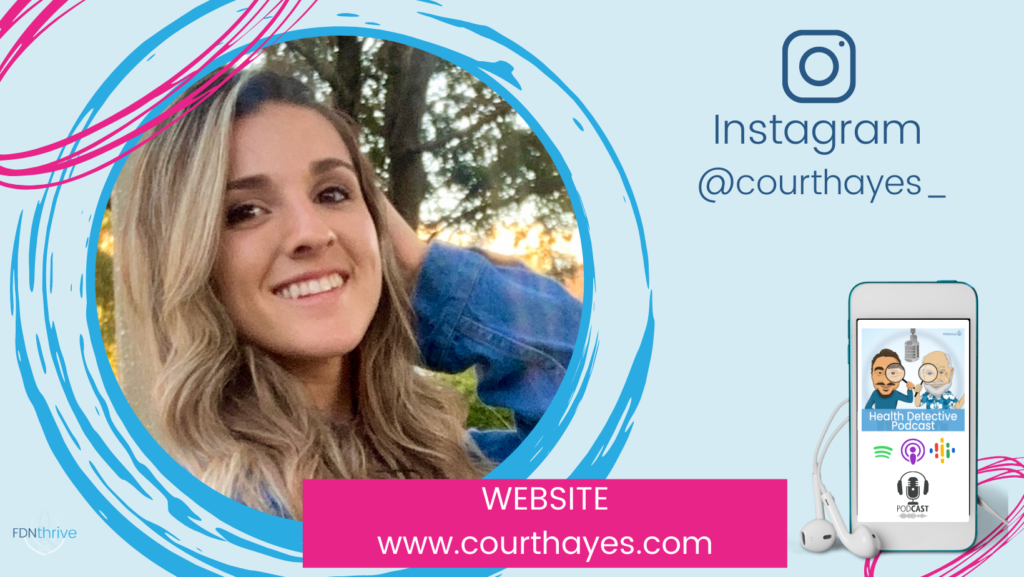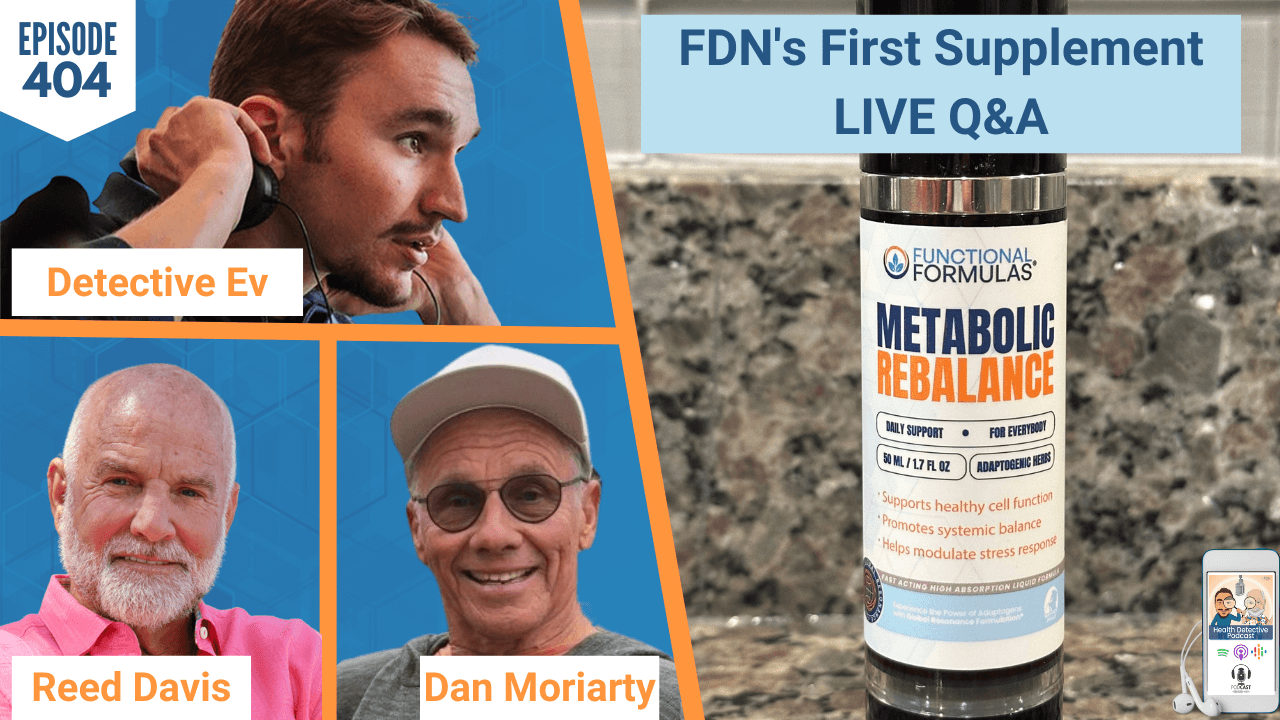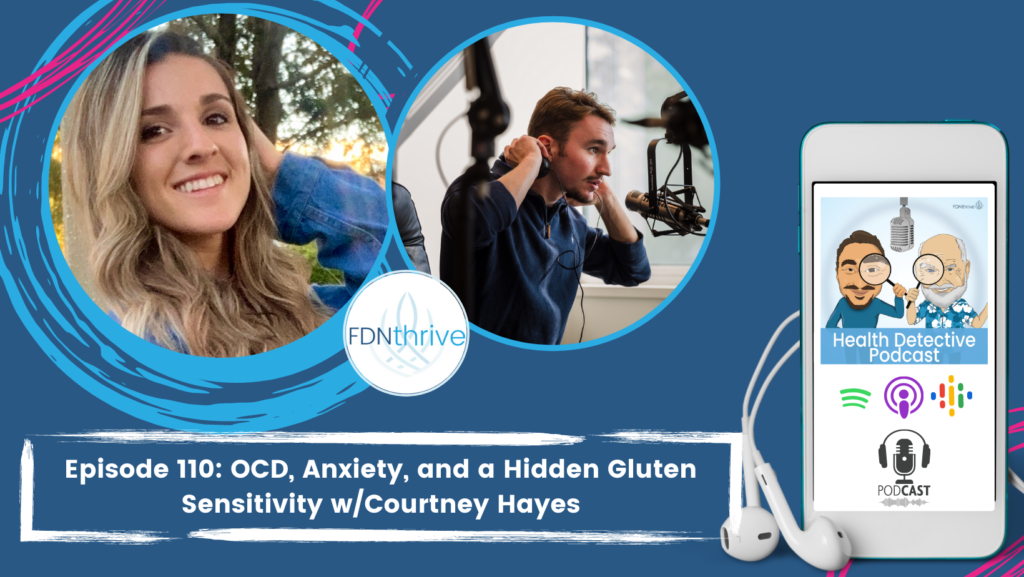
Introduction
[00:01:09] Detective Ev: it. What is going on my friends? Welcome back to another episode of the Health Detective Podcast by FDNthrive. My name is Evan Transue, AKA Detective EV. I will be your host for today’s show about gluten sensitivity and the anxiety that can result.
Now we’ll be talking to Ms. Courtney Hayes. We have an interesting friendship because she grew up super local to me, probably 20 minutes away. Never knew each other, never heard of each other, nothing like that. Separate schools and school districts, I believe. Then as we got older, we actually had mutual friends and she met the mutual friends in Florida of all things.
So, small world, kind of funny how that all ends up working out, but we have pretty similar stories. What I mean by that is not so much the physical health stuff. Although we do relate in certain areas of the physical health stuff on namely acne, gut stuff, whatever, but it’s really the mental health aspect of this story, which has always made me go, wow!
I interviewed Courtney probably two years ago on the first podcast that I ever did, which was, my goodness, pretty bootstrap, pretty rough. You know, we’ve come a long way since then. We were on there and I couldn’t believe the similarities, but she was dealing with full blown symptoms of legitimate mental health conditions before the age of 10.

And when this occurs, you would expect typically to see someone with a history of trauma, but that’s where Courtney and I really relate because we just didn’t have that. In fact, it was kind of the opposite. I wouldn’t say spoiled, but I mean, dude, we had pretty good lives. We grew up in a beautiful area. There wasn’t much to complain about, yet here we are dealing with these very severe mental health symptoms.
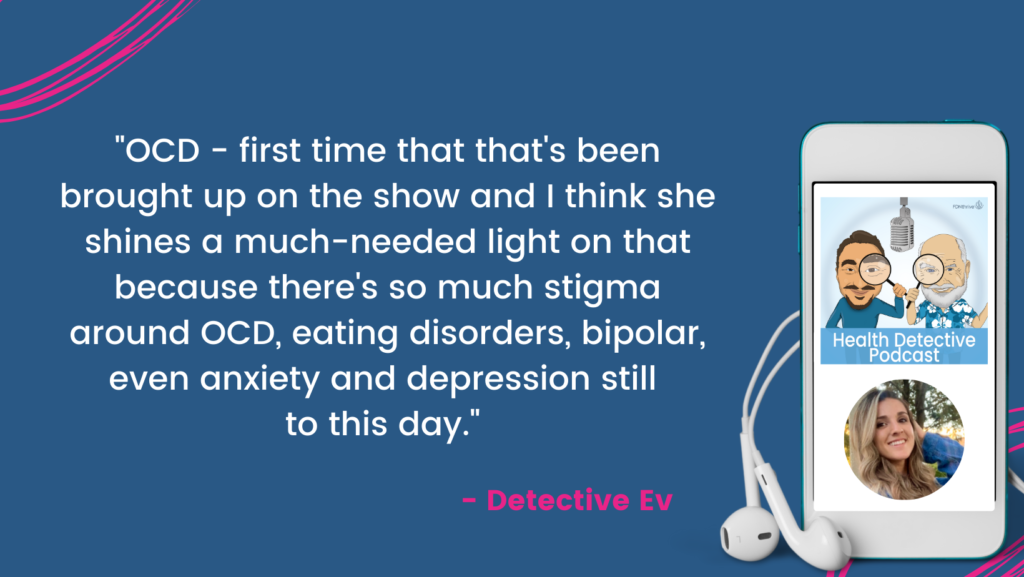
So, I won’t go too much more into it. I will just say if mental health is something that you’ve dealt with, you’ll definitely like this episode. Also as well, OCD – first time that that’s been brought up on the show and I think she shines a much-needed light on that because there’s so much stigma around OCD, eating disorders, bipolar, even anxiety and depression still to this day.
It really just comes from ignorance. Even as someone who’s been through this himself, I can kind of understand it because it is very hard and even strange to try to explain to someone the symptoms that you’re dealing with or the experiences that you’re having with mental health, because it’s primarily an internal one.
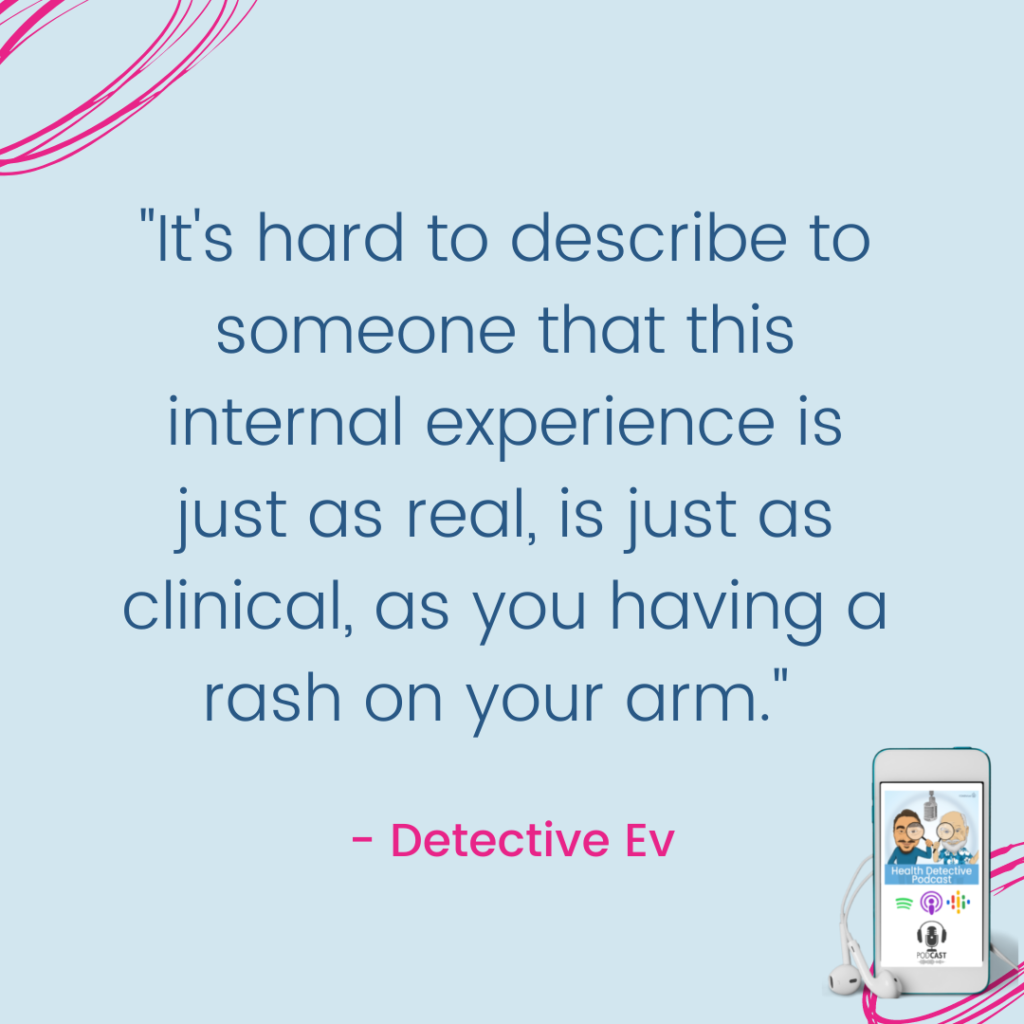
It’s hard to describe to someone that this internal experience is just as real, is just as clinical, as you having a rash on your arm. It’s really no different. I’ll leave it at that for now. A little bit about Courtney and what she’s doing today, after a 15-year battle with her own health, which was both physical and mental, Courtney took matters into her own hands and discovered what a 180-degree change of healing looks like through the use of holistic nutrition.
Courtney’s Background
Courtney studied at the Institute of Integrative Nutrition, becoming a certified holistic health coach in 2019. After years of failed doctor’s visits, medications, and lifestyle habits that had her running in circles with her own health, (Wow! That sounds a lot like the cycle of trial and error that we always talk about here doesn’t it), she finally gathered the tools to not only help her turn her own life around, but also help other women do the same.
Courtney has a story that is on par with what we like to share here. We’d like to let people know that they’re not alone. Sometimes we do have some crazy experiences with the conventional medicine system when it comes to dealing with chronic issues.
So, without further ado, let’s get to the interview
All right, Courtney, welcome to the Health Detective Podcast. How are you?
Courtney Hayes: Good. How are you?
Detective Ev: I’m doing well.
I had interviewed Courtney before on my first ever podcast, which was quite bootstrap. I used to do this thing by literally opening up the anchor app on the phone and I’d record off of that. It sounded insane, but people liked it. It was all about mental health. Now we have upgraded quite a bit. I’m excited about that.
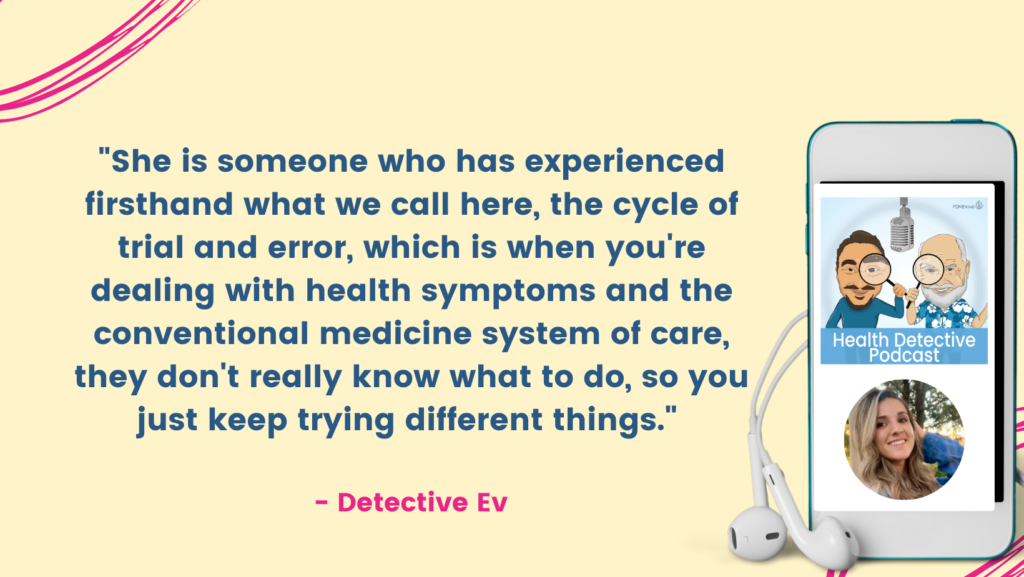
Courtney has a very relevant story as I kind of suggested in the intro. To what we’re talking about today? She is someone who has experienced firsthand what we call here, the cycle of trial and error, which is when you’re dealing with health symptoms and the conventional medicine system of care, they don’t really know what to do, so you just keep trying different things.
Then of course, many of us moved to more of the natural version of that, which may be as a step up. But nonetheless, it is a cycle of trial and error because we are stuck with these symptoms. We’re motivated. We want to do something, but no one seems to really have the answer for us.
Mental Health Issues at a Young Age
So, Courtney, we’re going to start off with the same question that we typically start off with on this show. What I want to know is when did these health symptoms start and what did they look like? And I know for you, it was primarily mental, I think if I recall correctly, there might’ve been some physical stuff as well.
[00:05:31] Courtney Hayes: Right.
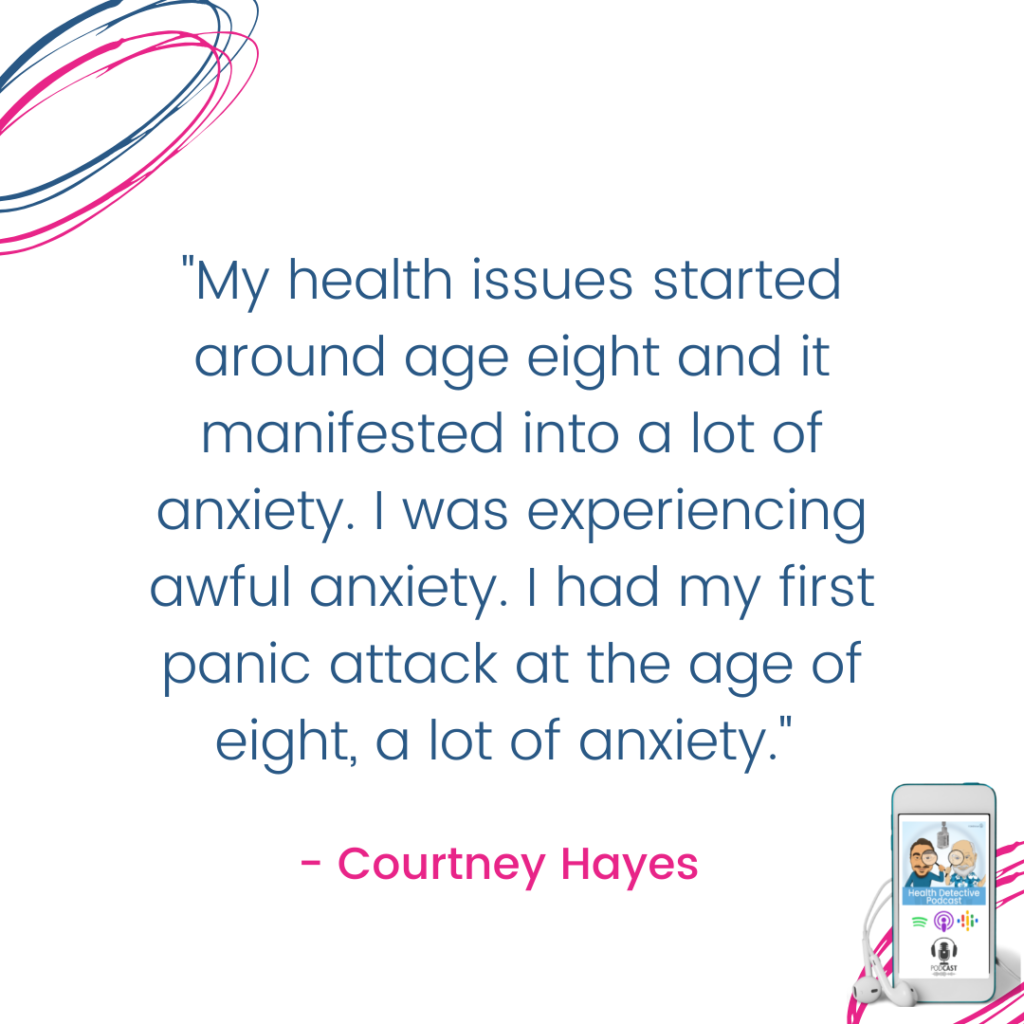
My health issues started around age eight and it manifested into a lot of anxiety. I was experiencing awful anxiety. I had my first panic attack at the age of eight, a lot of anxiety. I started developing symptoms of obsessive-compulsive disorder, OCD. Within that, it was just a whole streak of mental health issue after mental health issue. You know, mental health went completely downhill and that was years and years and years of that.
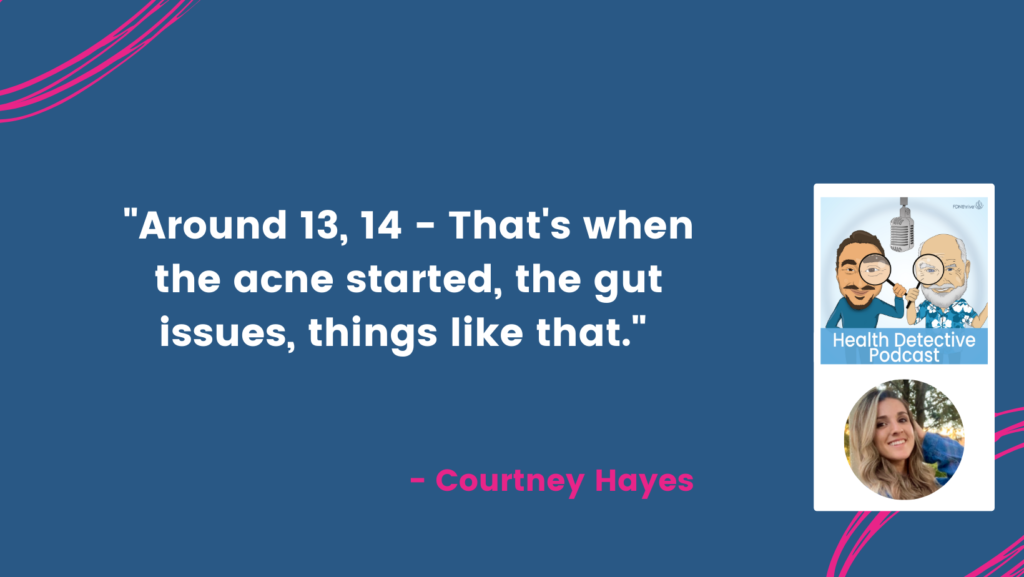
Then the physical started, my teenage years around puberty when that hit around 13, 14. That’s when the acne started, the gut issues, things like that.
[00:06:03] Detective Ev: Actually, I forgot how similar we were, and I think I had that same revelation last time, because it is rare for someone to be dealing with those symptoms so young. Also, add on top of that, just because I already know this about, you know, not to be graphic, but it’s not like we were abused in the home. Right?
We had decent enough lives, grew up in a beautiful area. We actually grew up kind of close to each other. We met each other after the fact.
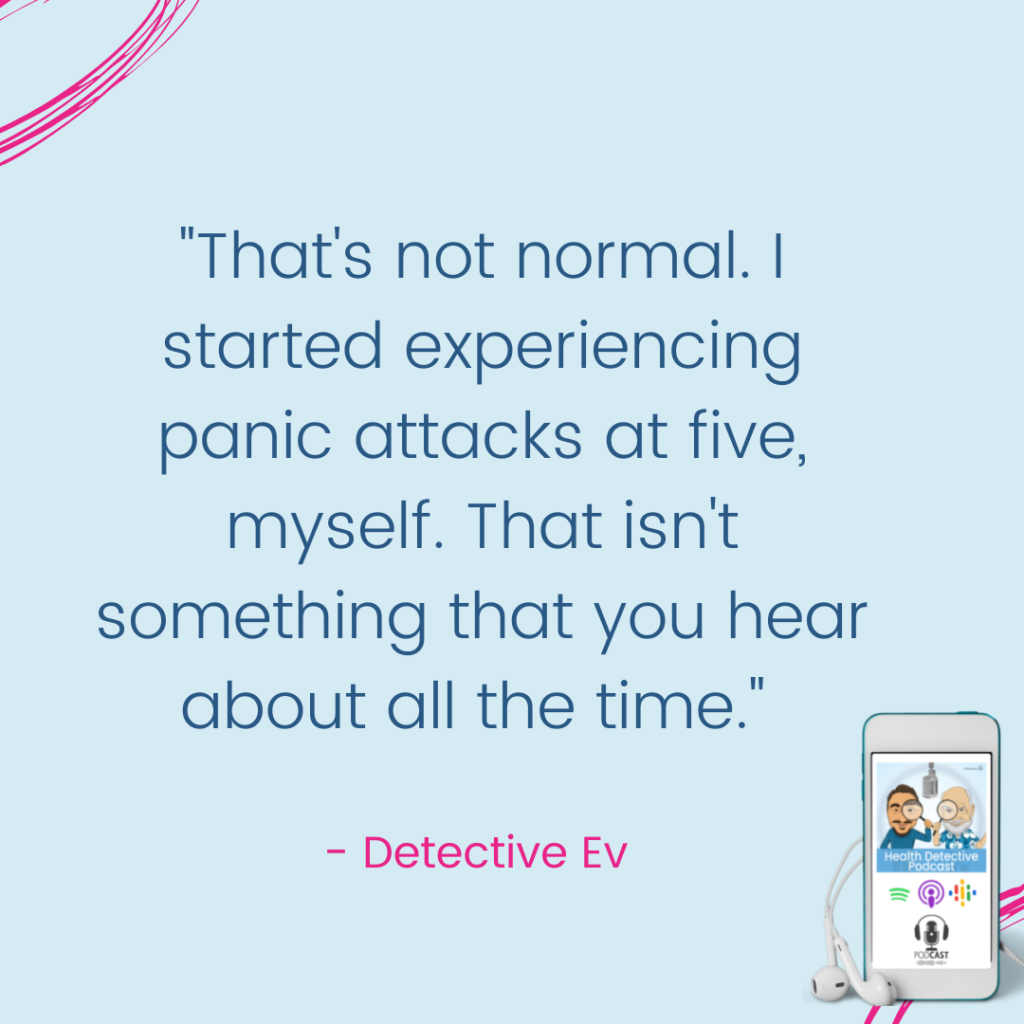
That’s strange. That’s not normal. I started experiencing panic attacks at five, myself. That isn’t something that you hear about all the time.
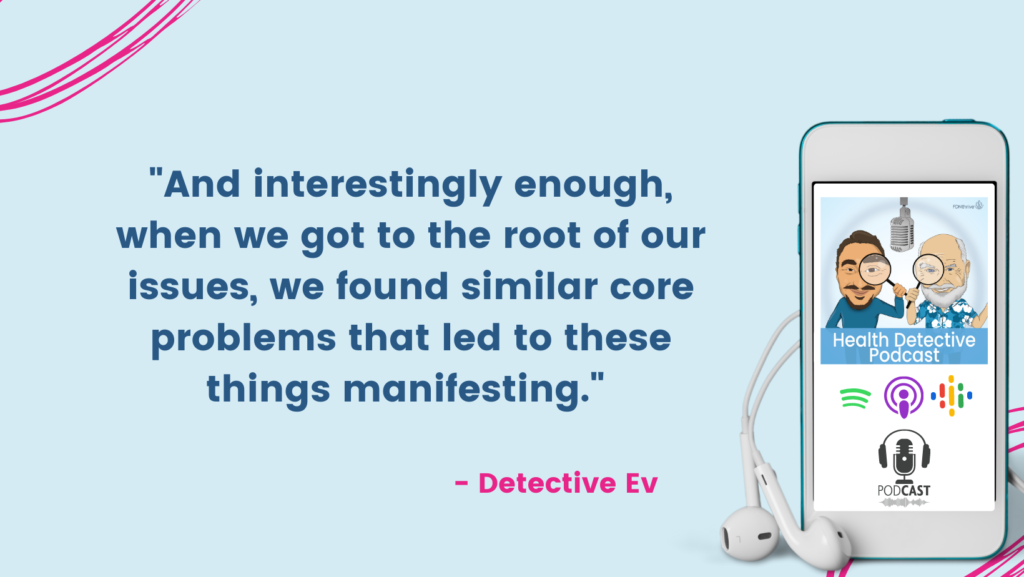
And interestingly enough, when we got to the root of our issues, we found similar core problems that led to these things manifesting. So, you’re having these things go on at a really young age. What is the perception on your end and your parents end, because did you even recognize that it was a panic attack while you were eight? Or was it just like, whoa, what’s going on here?
First Panic Attack
[00:06:47] Courtney Hayes: I remember, so vividly me pacing back and forth in my driveway just feeling like my world is crumbling, like I was going to die. I just, all of a sudden, I remember just being hysterically crying. It started over my sister got a stomach virus. She was getting sick inside and I had the same virus probably a couple of weeks prior.
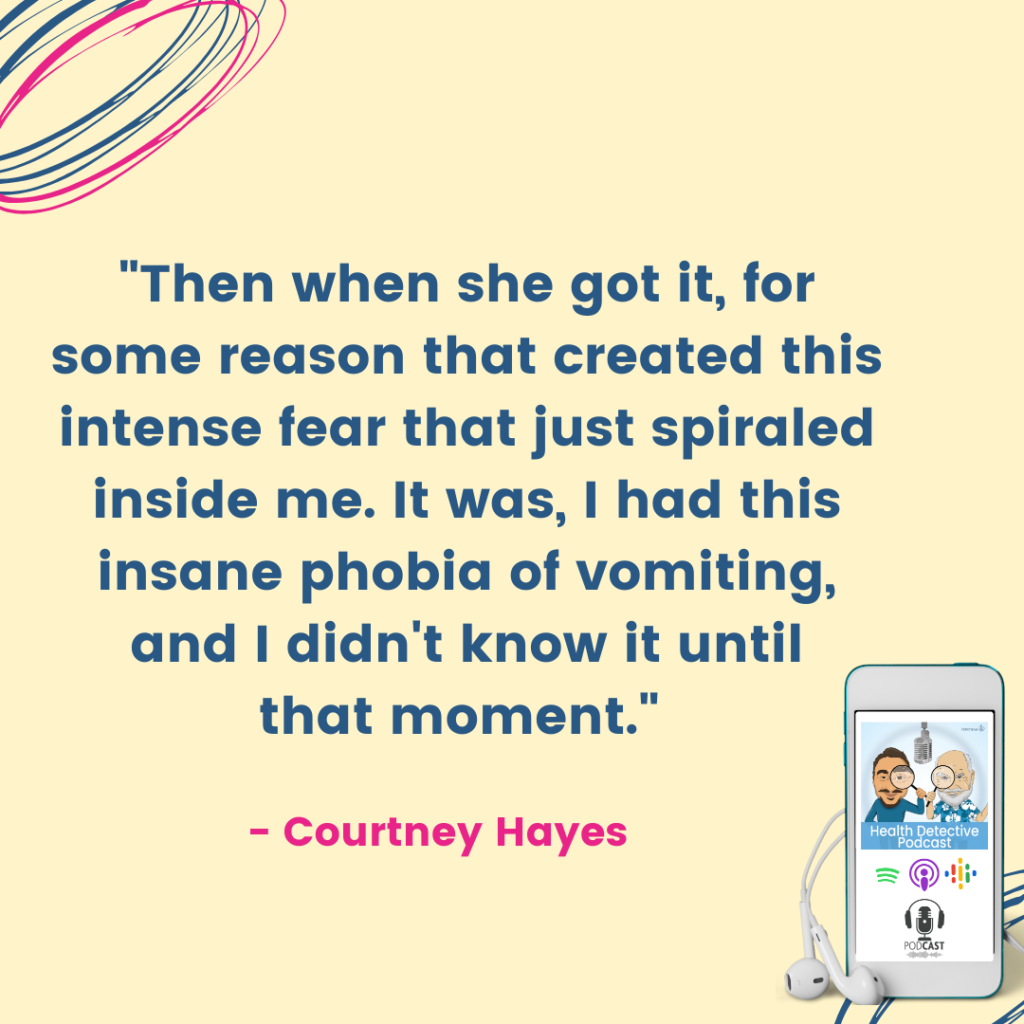
I was fine. No one enjoys it, but I moved on – it was life. Then when she got it, for some reason that created this intense fear that just spiraled inside me. It was, I had this insane phobia of vomiting, and I didn’t know it until that moment. So, that was me pacing back and forth. I remember the driveway. I remember exactly the temperature outside. I remember that so vividly and I was eight years old.
You know from there, I think my parents, I remember my mom had a really, really close friend and one of my aunts were both therapists. I remember she contacted them because I don’t think any of us had any idea what was going on. I might’ve had some forms of anxiety growing up, but more of just, I’m a kid, I’m a little bit anxious to leave home, or I don’t want to be with my mom, you know, nothing really out of the ordinary.
So, for that to all the sudden hit me one day out of the blue when there was no really warning sign of it, we were all shocked. From there, it was her talking to therapists and family and friends, and we’re all just trying to understand it.
You Don’t Know What You Don’t Know
[00:07:54] Detective Ev: Yeah.
I think that’s the biggest key is I remember, when I talked about this on the show before, when we went into the doctor the first time, cause my parents saw what we now know was a panic attack a few times, they had no training in mental health, no idea what this was. Even the doctor at the time didn’t.
And we’re the same age, if I’m not mistaking. Are you 26 right now? Or 25?
Courtney Hayes: 26.
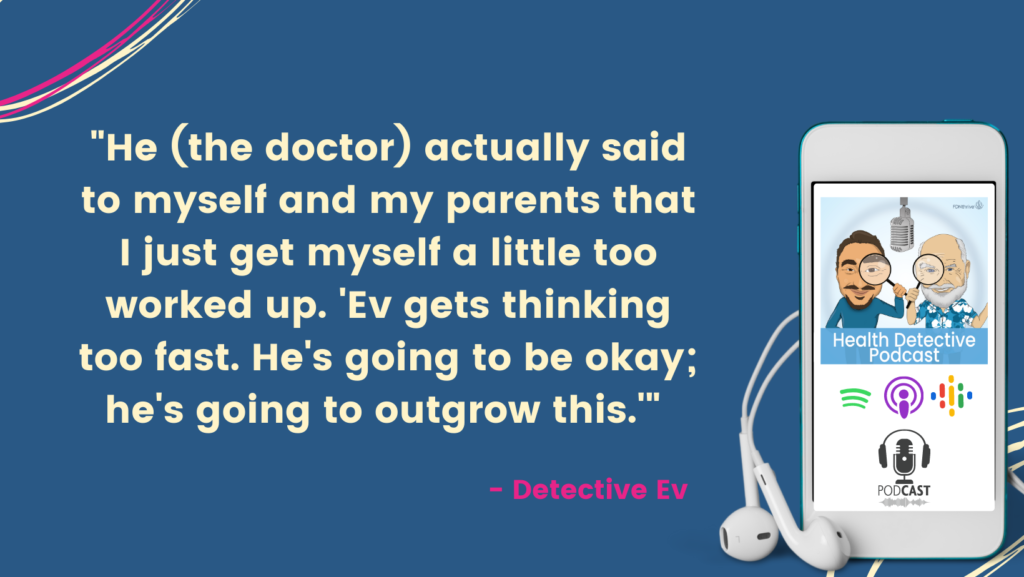
Detective Ev: We’ve come a long way is my point. We grew up again in a pretty nice area to be honest. We probably had 95th percentile or higher access to medical care in terms of the quality, yet the doctor didn’t even recognize that it was a panic attack. He actually said to myself and my parents that I just get myself a little too worked up. “Ev gets thinking too fast. He’s going to be okay; he’s going to outgrow this.”
And that was through no fault of his own. He meant well. He didn’t want me to be suffering, but we just didn’t know what we didn’t know. It is so uncommon for a kid that’s coming from a good background to be exhibiting those symptoms that it doesn’t make sense.
One thing I think that’s worth mentioning is the mental health topic, one – I’m positively biased with it because I understand it. But number two is I always just like to be clear for people, what you even said about how that development of the phobia with vomiting manifested, that is still something to be looked at. Because you think, oh, well of course she has this, you know, she saw that and just got triggered. Well, why doesn’t everyone get triggered that way? You know?
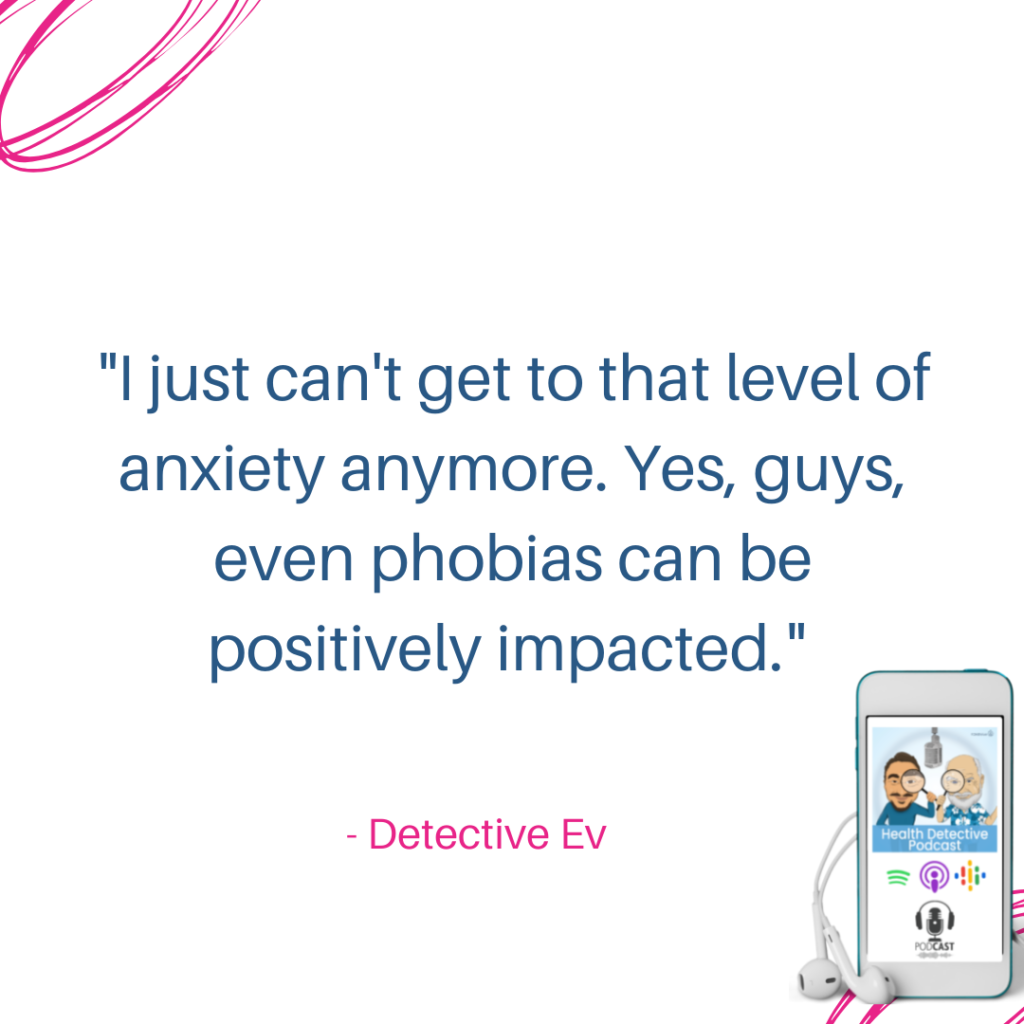
And you had these other things going on, clearly biochemically, and I think just like myself having this phobic level fear of planes. I do not like planes; I’m sure to this day you still don’t like vomiting. But I haven’t had a panic attack on a plane since I was a kid. I just can’t get to that level of anxiety anymore. Yes, guys, even phobias can be positively impacted.
Middle School and High School
Moving along here, what did this look like in your school year, as the middle school, high school stuff? I already have this existing knowledge about you, and I know that it was not resolved for many years or even properly addressed. What was going on and what was the treatment like, if anything?
[00:09:48] Courtney Hayes: I remember I went to my first doctor’s appointment probably several months later. I know I was nine years old. I remember when I moved to Florida, I found my previous records from the first psychiatrist I ever went to. I was nine years old and that was when I was placed on my first antidepressant.
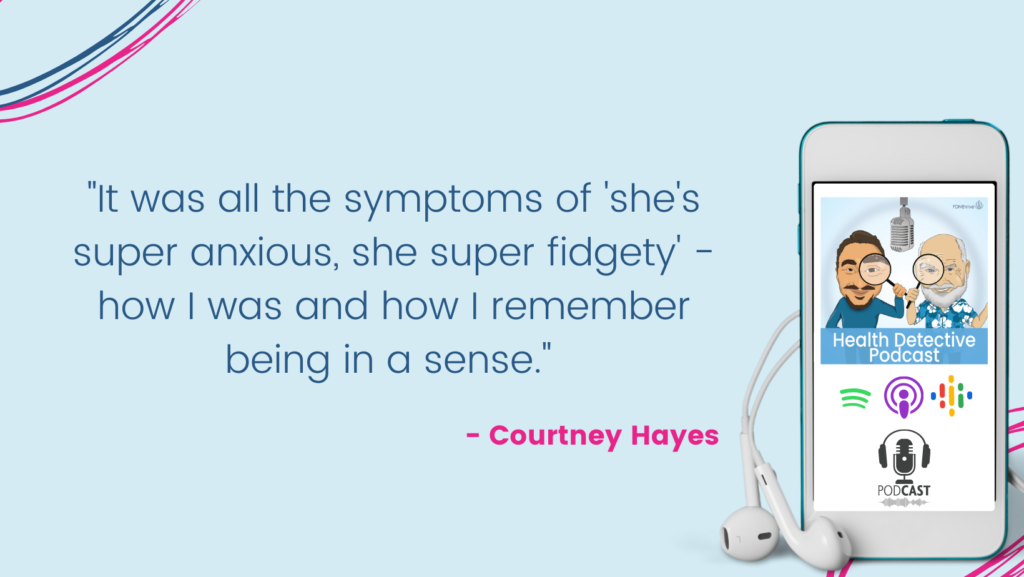
You know, I don’t remember specifically that exact scenario, but even reading back on the paperwork, it was all the symptoms of “she’s super anxious, she super fidgety” – how I was and how I remember being in a sense.
Cycle of Trial and Error
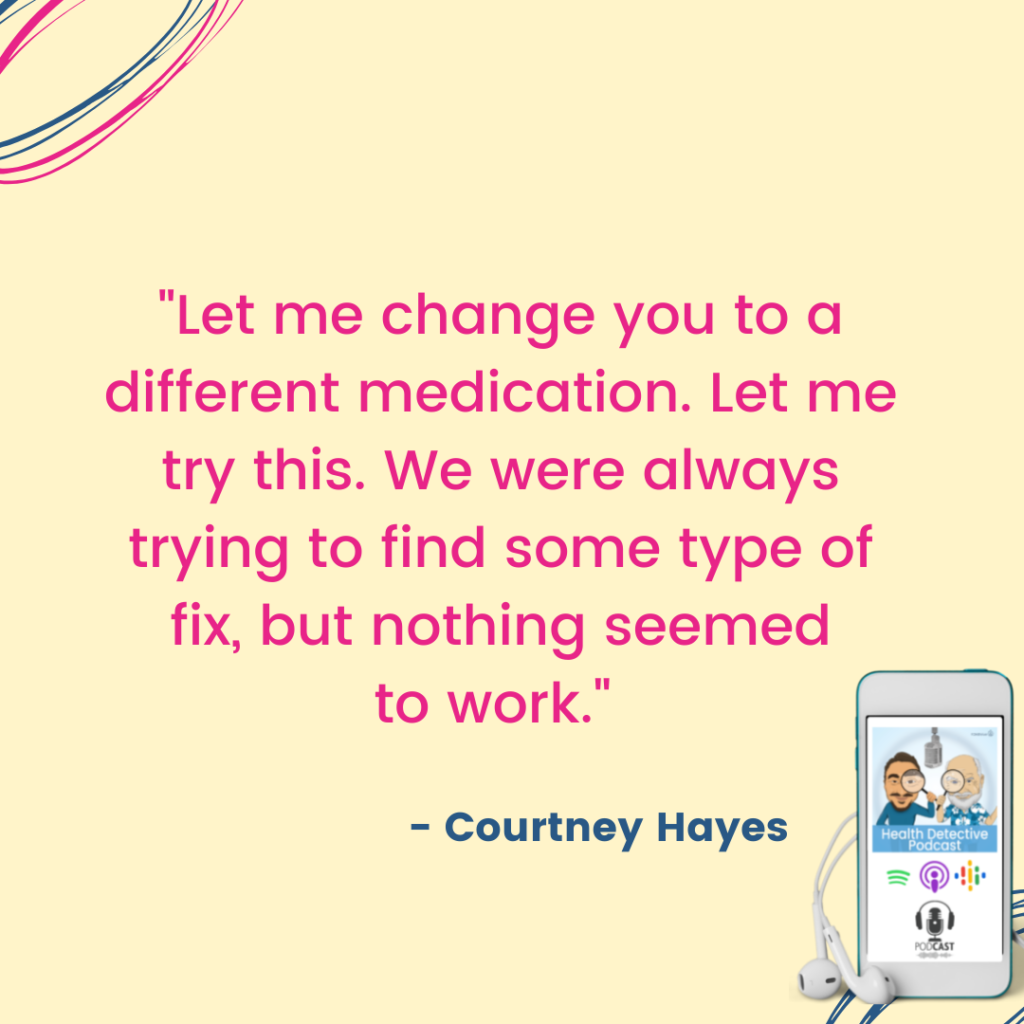
But I just remember specifically my childhood, it was year after year after year, month after month, week after week, constantly changing therapists, changing psychiatrist, changing medication. Let me change this dose. Let me change you to a different medication. Let me try this. We were always trying to find some type of fix, but nothing seemed to work.
I remember going through phases where I would check in with the doctor every month or every other week. It was more so like, how are your symptoms on a 1 to 10? I’d be like, well today’s a seven it’s not a ten. So, they’d be like, we’re making progress. Let’s keep you on this.
But it was never a three, never a two, never remotely close to how I am today. You know, it was struggle after struggle. I remember moments of quote, unquote “relief,” but it was never fully, “Wow, I really feel like I’m living my life with ease and I’m living my life without this anxiety or without all these issues.”
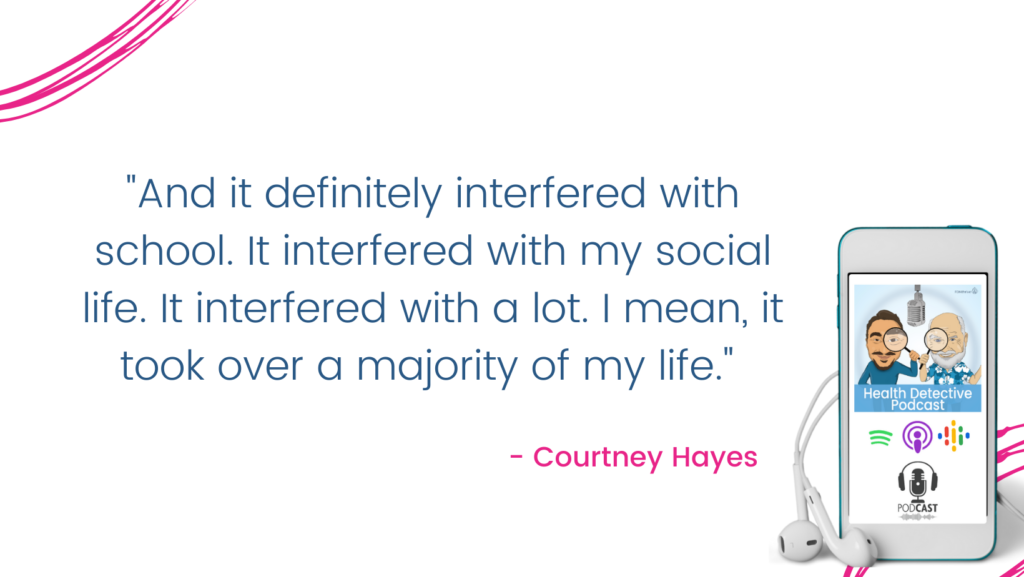
And it definitely interfered with school. It interfered with my social life. It interfered with a lot. I mean, it took over a majority of my life.
[00:11:04] Detective Ev: Sure.
With the OCD, especially, I want to focus on that for a second. Because we’ve been lucky enough to have, I mean, we’re well over, I don’t know what this will be, either episode 109 or 110. I mean, we have had so many people come on and we’ve talked about anorexia, we’ve talked about bulimia, we’ve talked about, I think even bipolar – things that you don’t always get to hear, especially from a holistic perspective.
As far as I know, at least in terms of them being open about it, no one has come on here and talked about OCD yet. So, that is something I think that’s really misunderstood. Just like when someone gets angry for a moment, people will go, you’re acting so bipolar. Such an ignorant and stupid statement. You know, someone will be like, oh, I like to have an organized desk; I’m so OCD. That is idiotic.
What OCD is Like
So, what is OCD actually like? And what was that experience like? This is not just an organized desk.

[00:11:49] Courtney Hayes: Yeah, OCD for me, you know, it’s obsessive-compulsive disorder. For me it was, I had this obsessive thought, and I had such a phobia around vomiting that it was this obsessive thought of, well, I need to do everything I can possibly to prevent myself from that happening, but that means with compulsion.
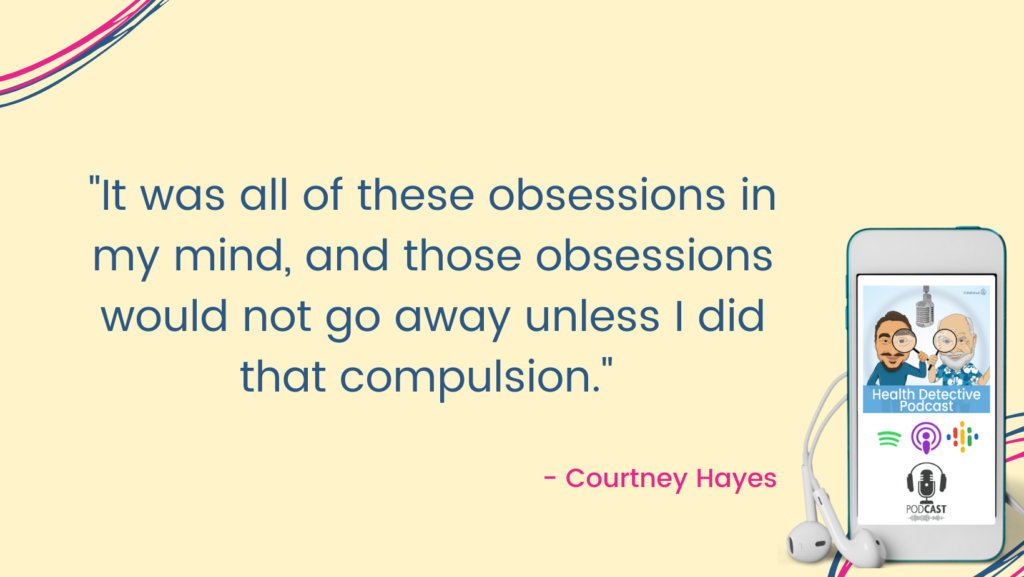
So, a lot of times it was in numbers. And for me, my number was always four or even numbers. For me, I’m like, well, I have to turn the light switch on and off four times. And if I don’t, I’m going to throw up or I’m going to die, something drastic is going to happen. Or I’m going to have to touch this pillow four times. Otherwise, something terrible is going to happen. It was all of these obsessions in my mind, and those obsessions would not go away unless I did that compulsion.
And you know, they say, the more you ignore it, the less they’ll come. But it’s also, the more you ignored it, the louder those voices would get. That was a huge part of my anxiety, pretty much all of childhood.
[00:12:38] Detective Ev: I think just that short explanation really helps people understand that this is a lot different than the “organizing your desk” thing, guys.
I mean, certainly for some people with OCD, maybe that is grouped into the other symptoms, but no, it’s a lot more than that. I don’t know why it escaped me eventually because as far as I remember in middle school, high school years, even though my mental health was terrible, I didn’t have the OCD thing.
But I developed this habit that, it was a couple things. It was very young, 5, 6, 7 years old. We’d be driving down the road, and you know how there’s the double yellow lines? There’s spaces in the yellow lines. I had this thing that we couldn’t cross when the yellow lines were open. We couldn’t cross another car.
Like, I don’t even know how to describe it. It’s like, if there’s two yellow lines here and a space here, our car couldn’t cross at the same time as that. I hated that. Then the other thing was that I had to blink when we passed a church. Otherwise, I thought I was going to die or something. Yeah, that was never a diagnosed thing for me.
But looking back, I’m not a psychologist, but from what you understand about OCD, doesn’t that sound like that would fall in that category?

[00:13:43] Courtney Hayes: Yeah. It pretty much is anything that you have to do, something in your mind, otherwise XYZ will happen. It could be the craziest thing. Yeah.
[00:13:50] Detective Ev: All right.
Upping the Max Dose?
So, we’re moving through those school years. Clearly, it’s affecting you. I know firsthand how that is. Then I know from last time when we talked, there was a particular story that just drove me nuts. And that story alone could have been a podcast here, even if it was just the four or five minutes that it takes to tell it. I would’ve put that on because people need this – it’s validating for what’s happening in the world right now.
I think you already know what I’m referring to. Talk to us about how we even got to that doctor’s appointment. And then what the heck happened that day because that was ridiculous.
[00:14:19] Courtney Hayes: I was in college and here I am, about 12, 13 years into the same cycle of every six weeks, I go to my psychiatrist and do a check-in. How’s my medication working? How’s my OCD? How’s my anxiety? I think I went probably a few months or maybe even six months without doing a checkup cause I was on at the time 200 milligrams of Zoloft. I had been on Zoloft for about six years. That was a medication that seemed to work best for me.
But I remember I started having a really bad flare up and this tended to happen with whatever anxiety medication I was on. It might work for a little bit of time, but then it would just stop working or I would have a really bad flare up and my mental health would really go downhill. I remember I scheduled an appointment right away.
I was like, something’s not okay. I don’t feel right. I’m having awful anxiety. I can barely function. I’m in college. I can’t do this. I was someone where, if she was going to put me on a medication, I was right away in the office, Googling, “Is this okay?” You know, “I’m a smaller person. Is this too much for me?”
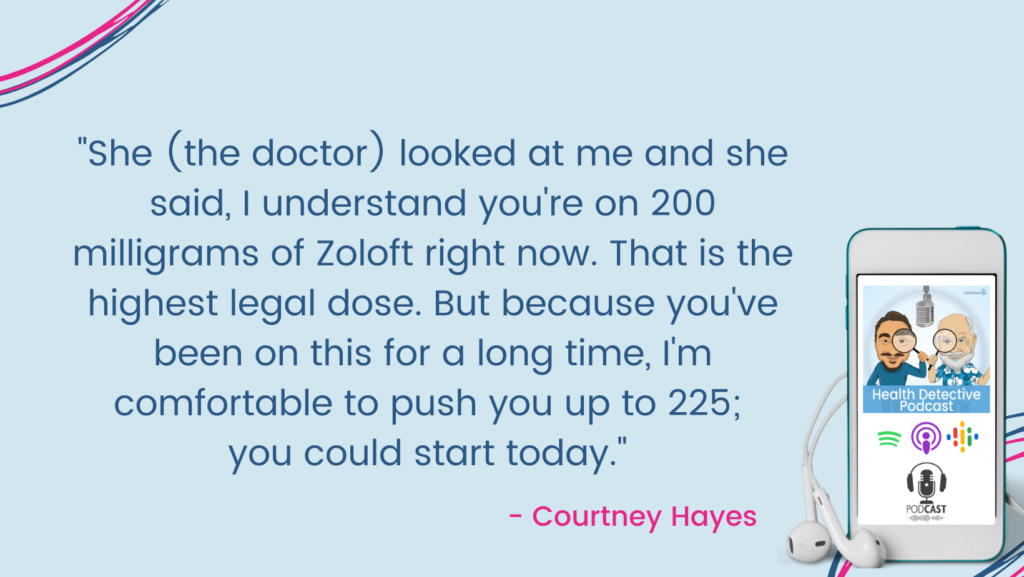
She looked at me and she said, I understand you’re on 200 milligrams of Zoloft right now. That is the highest legal dose. But because you’ve been on this for a long time, I’m comfortable to push you up to 225; you could start today.
Breaking Points

And immediately, that was my absolute life changing moment. I walked out of that office. I don’t remember a single word she said after the rest of that appointment, I was so angry, so frustrated. I remember I went to that appointment by myself, and I called my mom immediately after, and I was like, I’m done with the medication. I’m done with this doctor. I’m never stepping foot here again. I don’t know what the next route is going to be but whatever I’m doing for the past 14 years, isn’t it. And that was my breaking point.
[00:15:50] Detective Ev: Obviously we’ve talked about this before. You’re in a better place now, we can smile about it now. But that’s a hell of a powerful moment and that’s ridiculous.
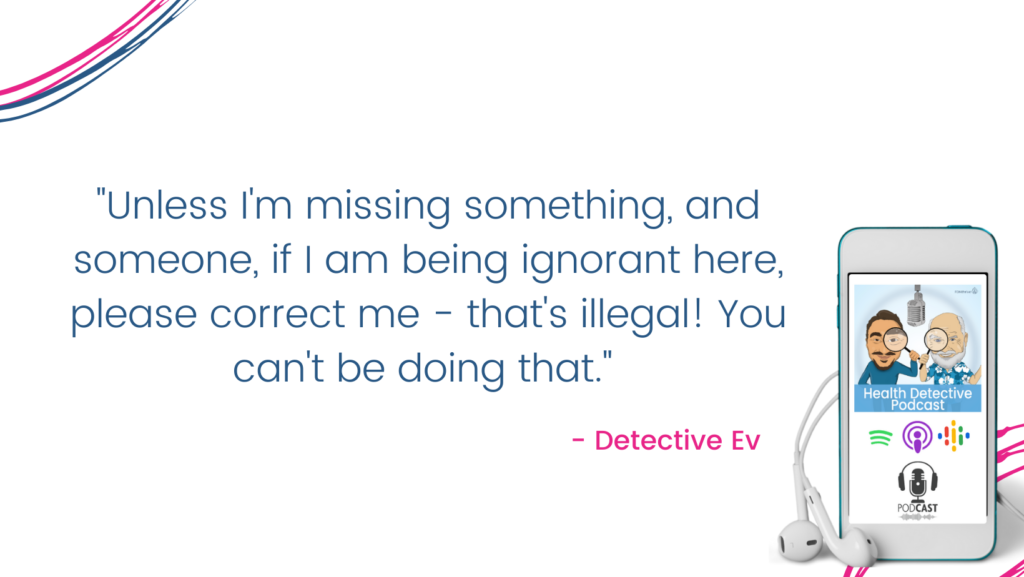
I hear so much crazy stuff on this podcast, but that is literally, unless I’m missing something, and someone, if I am being ignorant here, please correct me – that’s illegal! You can’t be doing that. Because I was about to say, if people don’t know the dosages, 200 milligrams of Zoloft is already, it’s quite a dose as it is, you know?
So, to then, “we’re going to even go higher than that”, it’s like, wow! Never asking why does Courtney, this person that’s been dealing with this stuff for years, have this to begin with? I knew that was your breaking point. I can kind of logically understand that from the sense of, this is illegal.
This doesn’t even make sense. There are so many people out there and I’m not condemning them. I’m always trying to figure out the ways people think about this stuff. I always ask this question. Was it just that, the illegality thing, that made you have that breaking point where you’re like this isn’t working or is it a gut feeling? What else was it that makes you say, this doesn’t make sense?
Because there are people, unfortunately it’s happened in my own family, that will go – I mean this literally – to their grave following the conventional system, never questioning why they have what they have.
What else was it, if anything, that made you say this doesn’t make sense and this isn’t right?
[00:17:03] Courtney Hayes: I think something just clicked in my brain that day, where I’m like, I’ve put so much trust in these doctors and this medicine. And I know that it works for a lot of people. I know that there’s a lot of “great” to it. But for me, it was just something clicked in that moment.
I don’t remember ever having a thought or a doubt about it in the past. I remember I was like, if you’re telling me this is going to help me, please, by all means, give it to me. I’ll take it. I won’t question it. I’ll do whatever it takes.

In that moment, I just reached a moment where I was like, this isn’t working and there’s no way that pushing more of this into my body when it seems like my body was rejecting it, it seems like it just wasn’t the answer. You know, I think it was a combination of that and it was combination of hearing her say the max dose is 200.
So, why are you putting me above, when I’m, you know, a 5′ 2″, 110-pound, 21-year-old woman at the time. It was just too much. I think right there, combination of those, it’s just like, no!
[00:17:57] Detective Ev: Fair enough. Because I’m also forgetting, yeah, at this point she said this was 21, this appointment?
Courtney Hayes: I was 21 years old.
Detective Ev: There’s such a long period of time that this has been going on in some way or another. At some point you would think everyone would have a breaking point where they’re just like, this is not working. Maybe that’s what happened to me even looking back because, yeah, I dealt with this for so young.
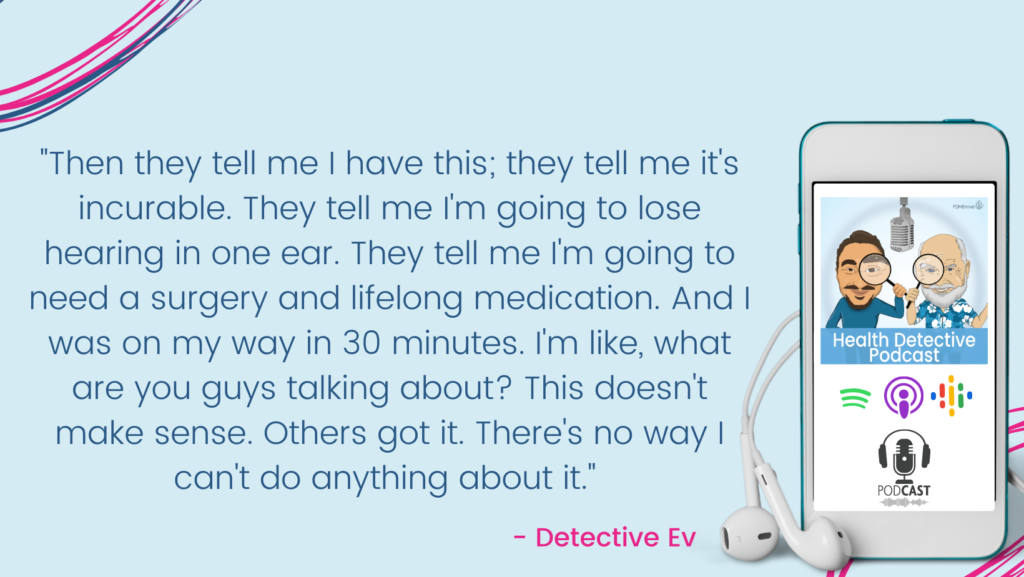
I got diagnosed with, of all things, this inner ear disorder. It was an auto immune disease. Ironically, out of all the things I’d been through, that was my breaking point. Because I thought I was finally doing better. Then they tell me I have this; they tell me it’s incurable. They tell me I’m going to lose hearing in one ear. They tell me I’m going to need a surgery and lifelong medication. And I was on my way in 30 minutes. I’m like, what are you guys talking about? This doesn’t make sense. Others got it. There’s no way I can’t do anything about it.
It’s interesting. You kind of had that in this doctor’s office, and I had the same thing. This doesn’t make sense. The reason I keep emphasizing this point, guys, and if you listen regularly, you know I do it all the time, but it’s worth hitting it over and over, is trust your gut.
I’m not saying that you maybe know more than a doctor. I don’t know more than a doctor about the respect of stuff that they talk about. You do know you, and you can still have common sense and say, I’ve been in here, we’ll say you went in for the first time at nine, let’s just call it that – 16 years. This isn’t working very well. I totally just did that math wrong – 12 years. Wow, that was way off. I’m not going to edit it out. I’ll leave in my accident there.
But yeah, I think that’s long enough either way. It’s just like this isn’t working and we got to do something else. What did that look like? Where did you even go next after that? At 21 years old, what does that look like?
Natural Healing Modalities Enter
[00:19:27] Courtney Hayes: I remember I had a friend at the time who was super into yoga and meditation and essential oils. We were good friends at the time, and I was spending a lot of time with her. I remember I went to her, and I explained the situation.
She was always super supportive – the anxiety and whatever I was going through. I remember she took me through my very first meditation and she gave me some lavender essential oils. She was like, here, and I was like, what do I do?

So, I remember after that we had a family friend who, she was the first one that ever opened me up to the mind-gut connection. She’s like, well, you know what you eat is going to correlate with how you’re feeling mentally. I was like, how? The gut’s here and the brain’s up here. What are you talking about? No one, in my however many years, has ever, ever, ever brought that to my attention.
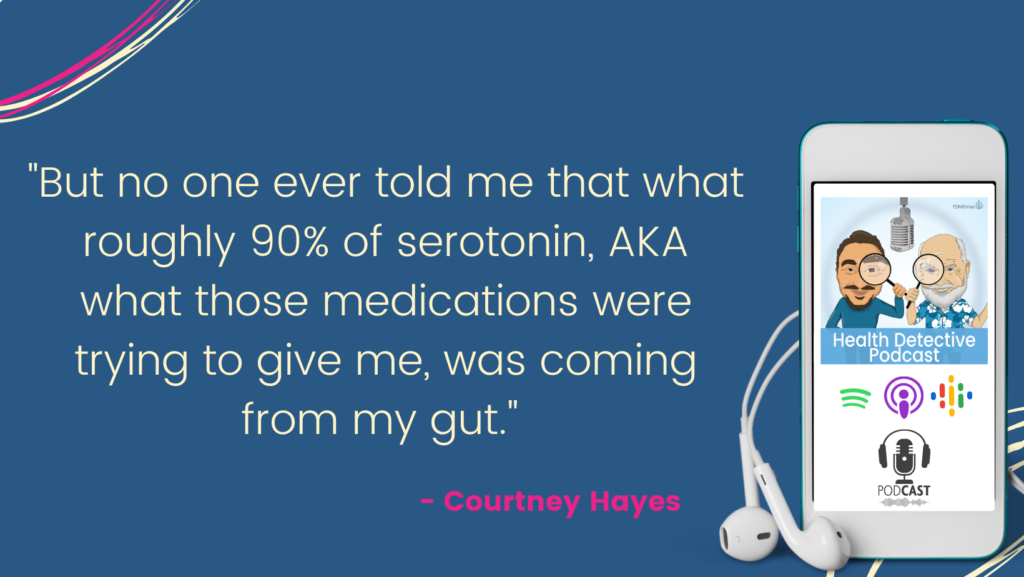
You know, I’ve been told like, hey, eat your vegetables. You should eat healthy, whatever it may be. But no one ever told me that what roughly 90% of serotonin, AKA what those medications were trying to give me, was coming from my gut.

My diet was words beyond awful. Like, I mean, bagels, pizza cookies. I lived off of probably 300 grams of sugar a day. Yeah, it was awful. Of course, I was going to eat terribly and feel terribly. So, when she told that to me, that’s where another one of those, “something just clicks in your brain”, where you’re like, well, if you’re going to tell me that’s the answer and I’m officially going to give up on this Western route of taking this medication, then let me look into all these different areas – whether it is the meditation, whether it is the practicing more mindfulness, whether it is really focusing on figuring out how the foods are impacting my gut, which is impacting my brain.
So, I went all in on that route, which obviously as you know, takes me here.
[00:20:58] Detective Ev: There’s many different routes in theory that you could take? What was it about that particular person that made you want to go to them?
[00:21:05] Courtney Hayes: It was a family friend. I remember, she had studied at the Institute for Integrative Nutrition, which was the nutrition school we both went to. I remember I looked up to her a lot because I knew that she was a super healthy person. She had healed a lot of health issues within herself. She was just someone that I intuitively felt like I can trust. Seeing that she also used to struggle with mental health issues and seeing that she was at the place that she was, something, again, just clicked to me. I just felt drawn to let me hear her out. Let me hear out someone else. Cause all I ever did was listen to the doctors, listen to Western medicine and I never even considered, I didn’t even hear a bit. There was no one in my life, in my circle, that went that route, went the more functional, holistic, more natural route of truth, real healing.
Trust Your Gut
[00:21:48] Detective Ev: I find it interesting, and I know our audience is super receptive of it, so I can focus in on it. More or less, let’s be honest, you kind of just have a feeling that this doesn’t make sense, the system that you’re in. And then more or less, there’s a feeling that says, oh, well, maybe that makes sense.
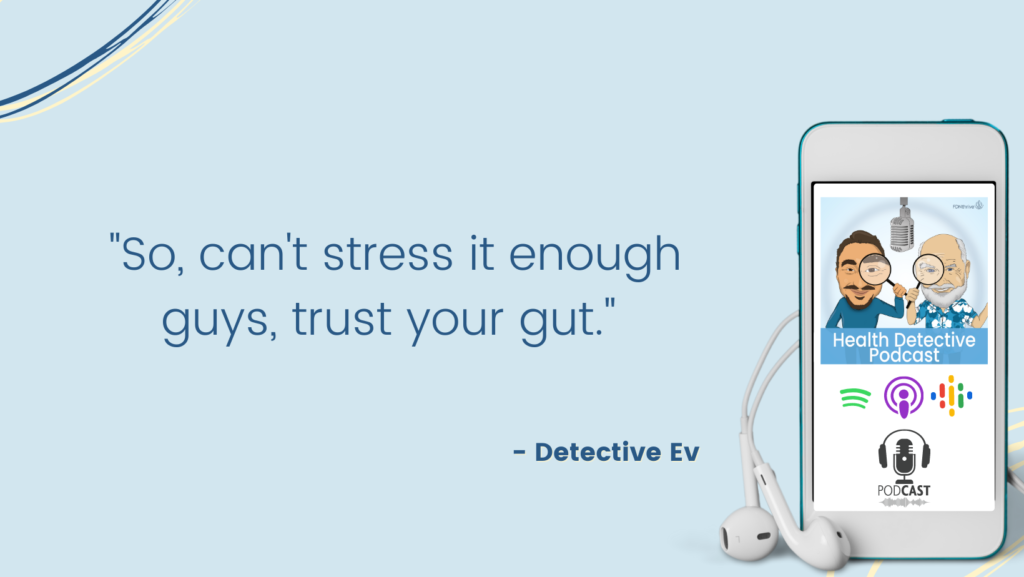
So, can’t stress it enough guys, trust your gut. I’d never trusted my gut. I do that a lot more now and I feel like my intuition completely guides me through life. A separate topic, I suppose, but every single person, I think it’s been maybe 98%, if I’m actually being specific here, has said something along the lines of, I just knew. I just felt. I just thought.
There was some point where they trusted themselves and their own inner knowledge to go away from this. I don’t know how you replicate that per se for someone else, but hopefully that’s validating for some people because we’ve had the most insane stories on here you’ve ever heard. Right? Severe mental health issues, cancer, auto immune diseases.

It just starts with that ability to think for ourselves more or less. Let’s take away the esoteric crap, I guess. Think for yourself, I think is the bottom line. My mom used to engrain that in my sister and I. So, you’re learning from this person, and I know it’s never going to be an overnight transformation for most of us that’s for sure.
But what were some of like, maybe the first wins? Because I know that you’re trying this stuff, but was it dietary changes? What was it specifically where you’re like, wow, no this worked? There’s some quantifiable improvement where I was like, wow, I’m 10% better right now. Or 20%. Was it again, diet, or was it the meditation? What was it specifically?
Experimenting
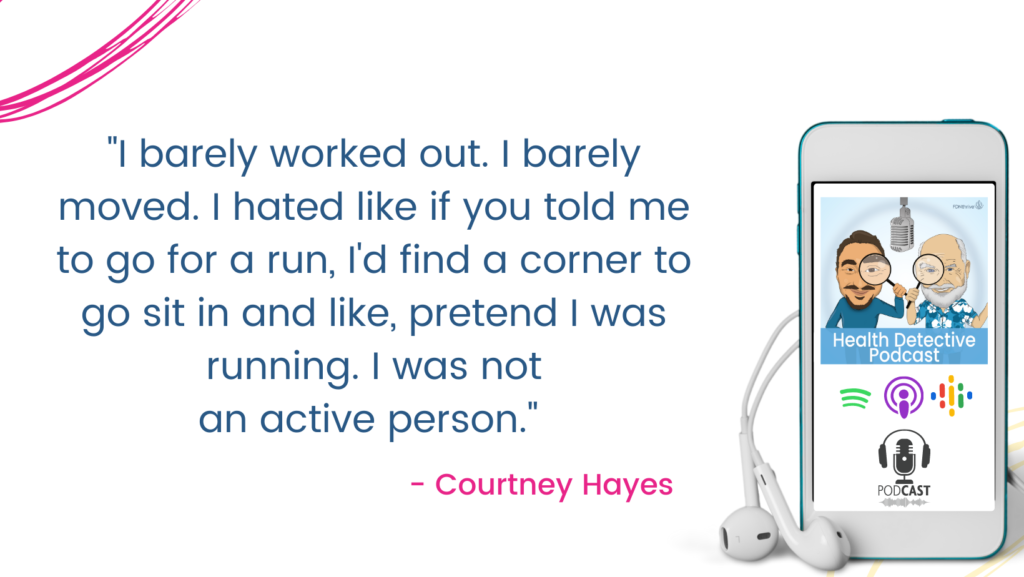
[00:23:08] Courtney Hayes: I would say the biggest things for me at that time were a combination of, cause in my childhood, I barely worked out. I barely moved. I hated like if you told me to go for a run, I’d find a corner to go sit in and like, pretend I was running. I was not an active person.

I played sports growing up, not the most active. I remember in college around that same time, I was living with roommates who were super into lifting and working out. I was like, well let me start doing that. I noticed me feel almost this sort of serotonin rush – endorphin rush – every time I was working out and I was like, this feels really good, but my diet was still awful. So, it wasn’t too much of a drastic change.
But once I had that conversation with the family friend, my diet started to change. And I remember experimenting. I started just by simply experimenting. Like, let me try to be a little bit more mindful. Let me eat a little bit more of the meals my mom was making or some of the meals that I’m finding online for healthy recipes.
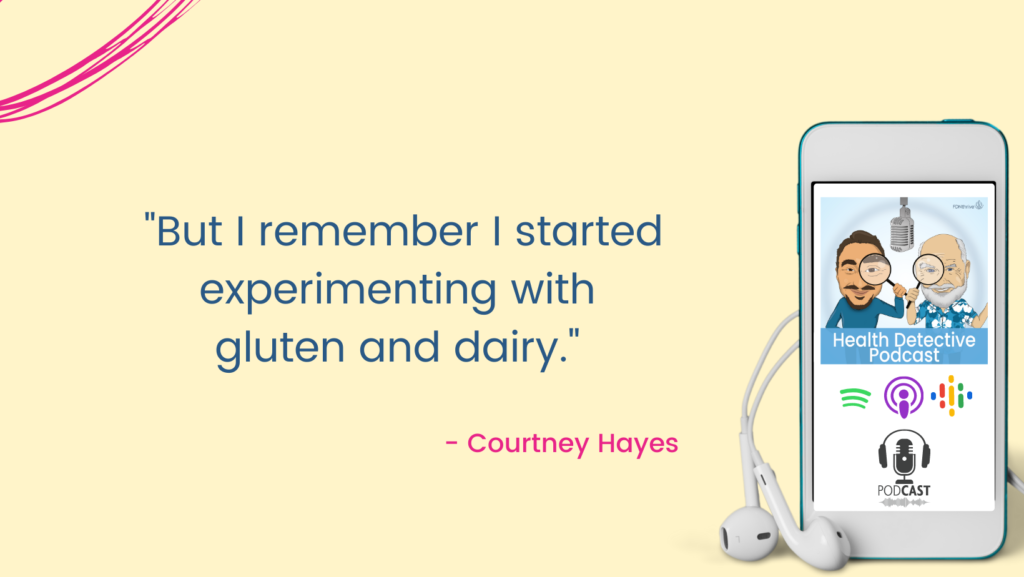
But I remember I started experimenting with gluten and dairy. I have a dad who has celiac disease. I have a sister who has a severe allergy to gluten as well. I’m like, I wouldn’t be shocked if this could be causing issues. You just never know. This family friend also has celiac disease, so I’m like there could be a correlation.

Ironically, at this time I noticed that my stomach was becoming super, super inflamed. I remember I would just be in so much pain. I remember being on a walk one day and I had to sit down on the bench because I was bending over in such severe pain when I had a piece of bread right before.
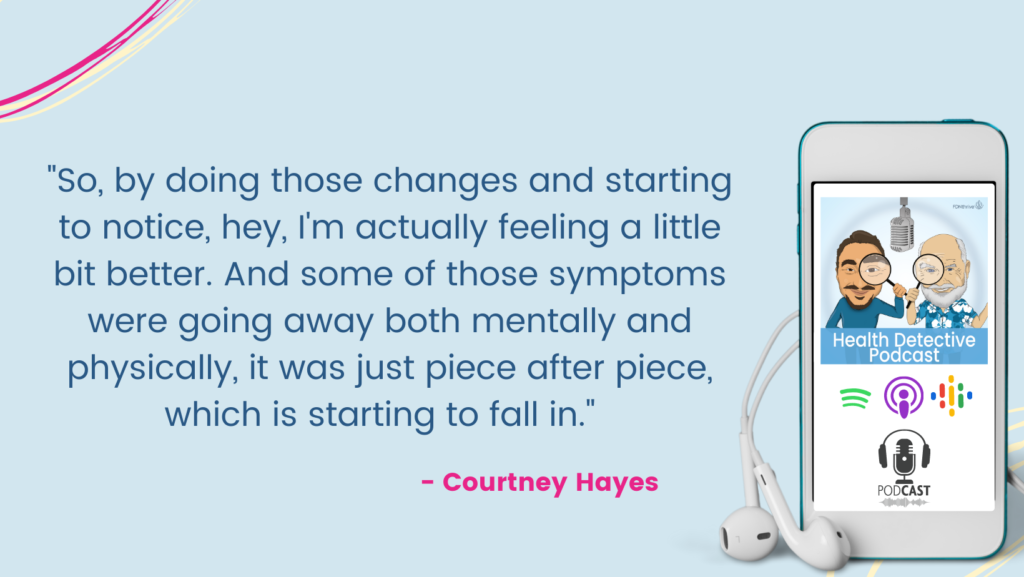
So, this was around the time where I was like, let me try experimenting. There might be some food sensitivities here. There might be something in my diet that is contributing. How can I start to clean this up? So, by doing those changes and starting to notice, hey, I’m actually feeling a little bit better. And some of those symptoms were going away both mentally and physically, it was just piece after piece, which is starting to fall in.
[00:24:47] Detective Ev: And let’s pause for a second. We got a shout out your dad. I always forget about that. Where can people find his work? Because this is so relevant to our audience. They would love this stuff.

[00:24:54] Courtney Hayes: glutendude.com. He’s got a website. He’s got a blog. He’s got an app. He’s gotten his Instagram page, Facebook page. Yeah, gluten dude.
[00:25:03] Detective Ev: That’s so cool. We got to have him on actually, he’s more than welcome anytime. That would be a great guy to have on.
So, you’re moving through here. When did you decide that this was something that you actually wanted to pursue? Because I know that, and we’ll talk about this, I knew that what you’re doing now is not necessarily holistic health coaching in the traditional definition because there’s more aspects to it than that. Still, it’s like, this is clearly something that you ended up pursuing.
Decisions & Passions
I think if I’m not mistaken, you were in college for something completely different at one point and then chose this. Tell us about that. I always find those stories cool.
[00:25:33] Courtney Hayes: I was undecided for my first three years of college, cause I was like, I still can’t figure it out. Then I decided to major in communication studies like this will be broad enough. I can find something to do in this area.
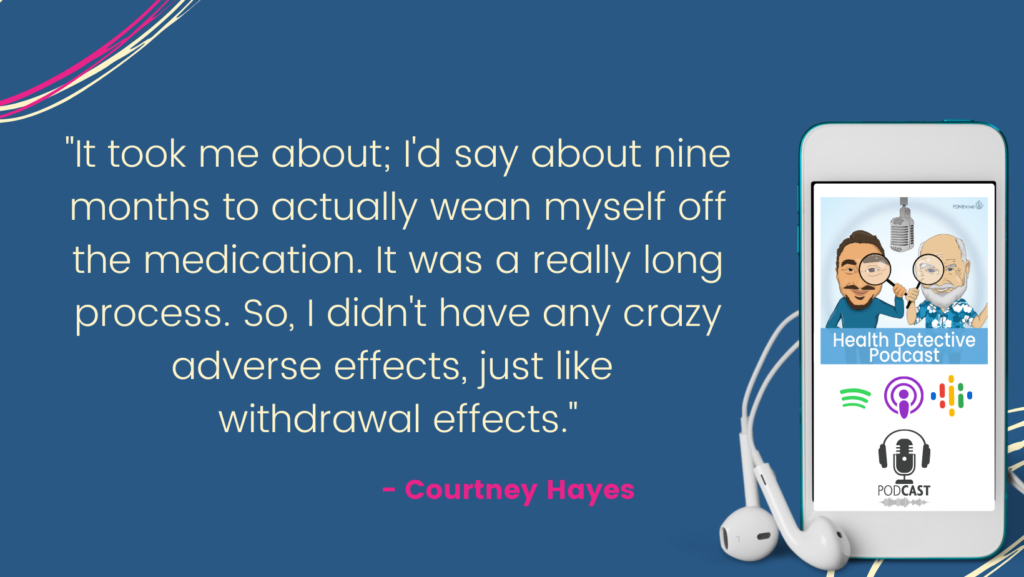
Then it took me until my senior year of college, where I found out about the Institute for Integrative Nutrition. It took me about; I’d say about nine months to actually wean myself off the medication. It was a really long process. So, I didn’t have any crazy adverse effects, just like withdrawal effects.

In that process of weaning myself off medication and actually finding true healing and true relief day by day through nurturing my body and practicing all these new things in my life, I just started developing this passion where I was like, all hours of the day, I just want to learn more. I want to figure out more ways. I was so intrigued by this, I felt like I just discovered something brand new in this entire world. I was so intrigued by it.
That’s where I discovered the Institute for Integrative Nutrition. I was like, I want to one – learn more for myself, but two – I got to help people change their lives too. I got to spread this information out there. I got to help people with this.
[00:26:34] Detective Ev: I think it’s amazing. I always joke that it’s like an industry that, it calls us. You know, no one wakes up yet at five years old and says, mom and dad, I can’t wait to be a functional health coach or a holistic health coach. It’s just not a thing yet.
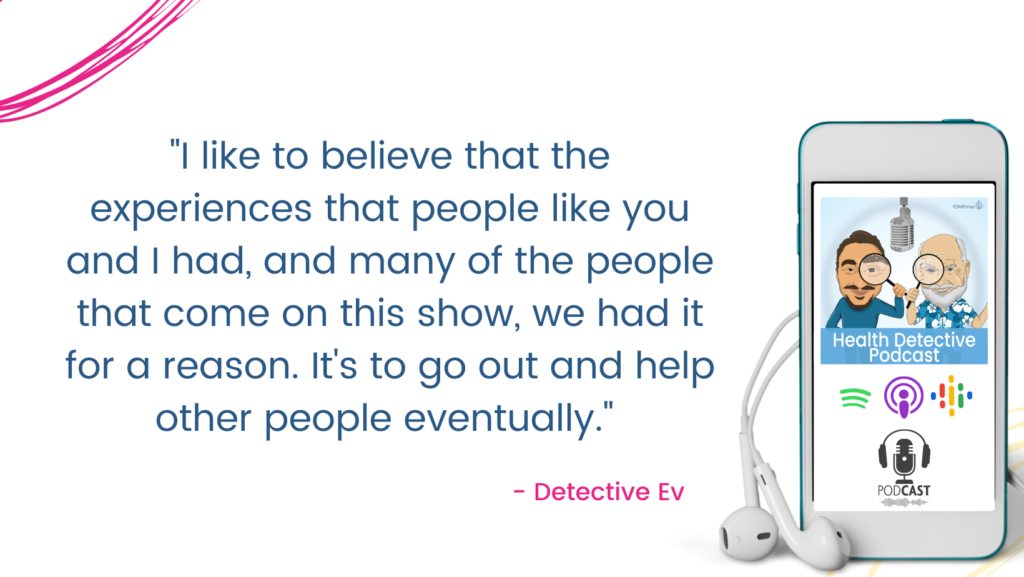
But through the experiences that we have, it leads to this. And I’m a spiritual guy, I have no problem saying it. I like to believe that the experiences that people like you and I had, and many of the people that come on this show, we had it for a reason. It’s to go out and help other people eventually.
I know for me school was my thing. I was a smart guy. Wasn’t good at sports, but I was a smart guy. But I hated school. I didn’t want to be learning those topics. Then I went from that to when I was going through IIN and then eventually FDN. I mean, my mom and dad were like, what is going on with this guy? Cause it was Friday night and I’m in at 8:00 PM and I’m just studying all the lectures as they came out.

I think IIN released on that day, and I’d literally finish them in the same night. Then I had to wait a week until you got the next stuff. You know what I mean? That’s just such a good feeling when you’re actually passionate about something that you just want to learn it.
Factors to the Wins
Yeah, we don’t expect this for anyone on the show. Some people come on and they do have complete resolution of symptoms. Some people are still working on some stuff. I know for you, you’re at a really, really solid place. What would you say have been some of the biggest factors that have led you to getting to where you are now? I mean, if you don’t mind, because again, we have people that come on that are 50% better.
Where would you say, at least in terms of the mental health stuff that you are percentage wise in terms of being better?
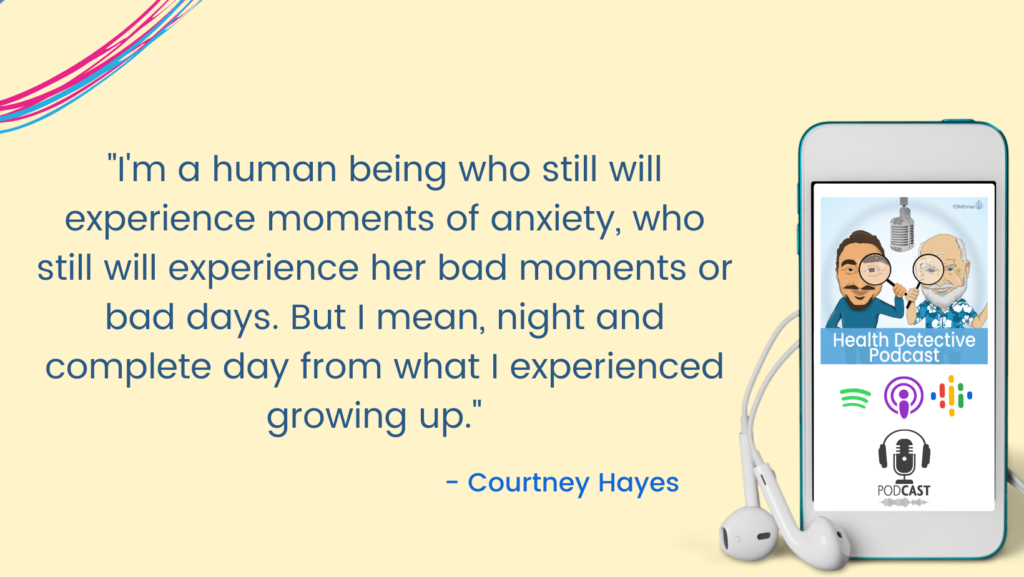
[00:27:53] Courtney Hayes: I would say, compare what I used to be, compared to now, I would say 90% better. We’d say night and day, you know? I’m a human being who still will experience moments of anxiety, who still will experience her bad moments or bad days. But I mean, night and complete day from what I experienced growing up.
[00:28:15] Detective Ev: Sure.
What were the biggest things that have led to that? Because I know that we talked about what initially helped, but like, what are the habits that had to be maintained to this day or things that you discovered? I feel like gluten was probably a huge one for you. You’re pretty religious with that, right?
[00:28:28] Courtney Hayes: Yeah.
Yeah. I haven’t had an ounce of gluten to my knowledge, unless at a restaurant, but that’s happened a couple of times. Intentionally, have not had gluten in about five years. Yeah, that’s been a difference.

It’s recognizing what foods are trigger foods for me. So, for me, dairy doesn’t make me feel the best. I’ll feel it in different mental ways too, and physical ways. It’s finding those sensitivities or triggers with things that your body might not react well to.
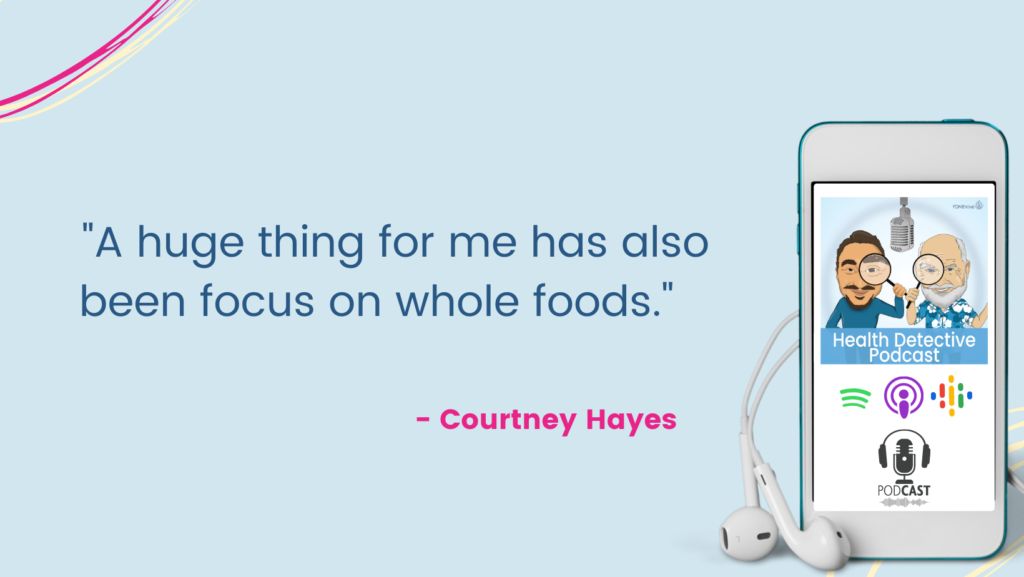
A huge thing for me has also been focus on whole foods. Focus on the foods that truly nourish you and that are there to heal you and nourish your body. I try to avoid a lot of processed foods and those artificial flavors and colorings and packagings.

And a lot of mindfulness. It’s really, really been a combination of the three things, which for me has been mindset and mindfulness. It’s been my nutrition and just focusing on healing my gut. And then it’s been just movement and getting my body moving. The three of those things have been just my complete medicine.
[00:29:20] Detective Ev: And it’s relatively simple. I’d say it’s definitely simple compared to the severity of the things that you were dealing with. And the gluten one’s particularly tough.
You don’t have celiac? It’s not diagnosed as far as you know?
[00:29:33] Courtney Hayes: Yeah, I did a blood test, and it was negative. So as far as I know I don’t.
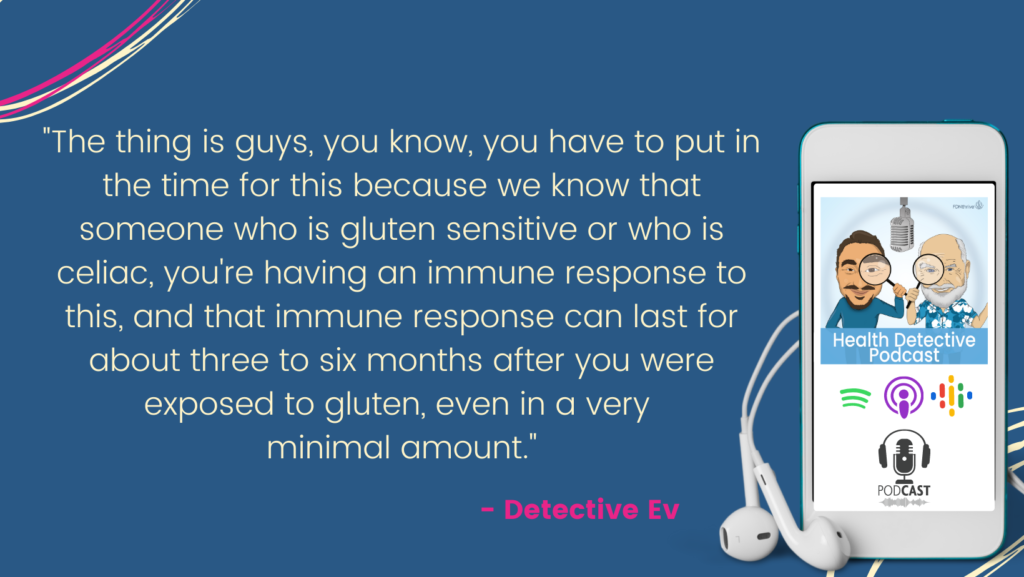
[00:29:38] Detective Ev: But almost guaranteed, have a gluten sensitivity, that’s pretty much for sure. The thing is guys, you know, you have to put in the time for this because we know that someone who is gluten sensitive or who is celiac, you’re having an immune response to this, and that immune response can last for about three to six months after you were exposed to gluten, even in a very minimal amount.
Healing Takes Time
If you’re going to do the gluten-free thing. You’re like, wow, this is inspiring; I want to try that. Make sure you’re doing it correctly first of all and giving yourself the proper time. It is not going to get better in a week. I’m not saying it won’t improve. I’ve seen that almost universally. But to act like you’re going to go from the things that you’re talking about, where, I mean, you’re doing the even number thing, I mean, this is severe. So, oh yeah, I’m fine in a week. Guys, that’s just unrealistic no matter what the food sensitivity is, especially with gluten though, give it, give it, give it time.

How long would you say that it had taken? This is fine however long it took. We want people to have realistic expectations. And for you, it’s not like you got the benefit of necessarily directly working with a coach that you’d find at FDNthrive or something.
I mean, you were experimenting. You’re trying this on your own. I know firsthand, that’s hard as hell, man. That is really tough. Cause there’s a lot of things that sound appealing. This diet sounds great. This person healed using this supplement. How long would you say that it took to get from that day in the office at 21 to 90% better? Was it years or months?
[00:30:55] Courtney Hayes: I would say it took probably about a solid year. Because I believe from my decent memory, maybe a year and a half. I’d say about a year and a half. Because I remember I took the leap and I moved myself to Florida on my own after graduating college.
And I remember when I got to Florida, I remember feeling in such a firm steady really, really good place with myself mentally. I know for a fact I would have not taken that leap and moved if I was still back in that state. It was about a year and a half after that appointment.
[00:31:20] Detective Ev: Perfect.
Being said guys, to be positive, not pessimistic. You’re like, oh, a year and a half. There’s two ways to look at that. Oh, a year and a half. Well, again, one – you were experimenting. That’s amazing that you even could get to 90% doing this on your own. It’s extremely impressive. So, it’s going to be quicker if you’re using someone else.
But the point is, this is an individual that we’re looking at who was sick from a young age for 12 years, 13 years, not 16. (I’ve been trying to figure out this whole podcast where I got that from. I’m usually good with the numbers but can’t figure it out.) That’s actually pretty good in my opinion, that this is even possible after being sick for so long and at such a young age.
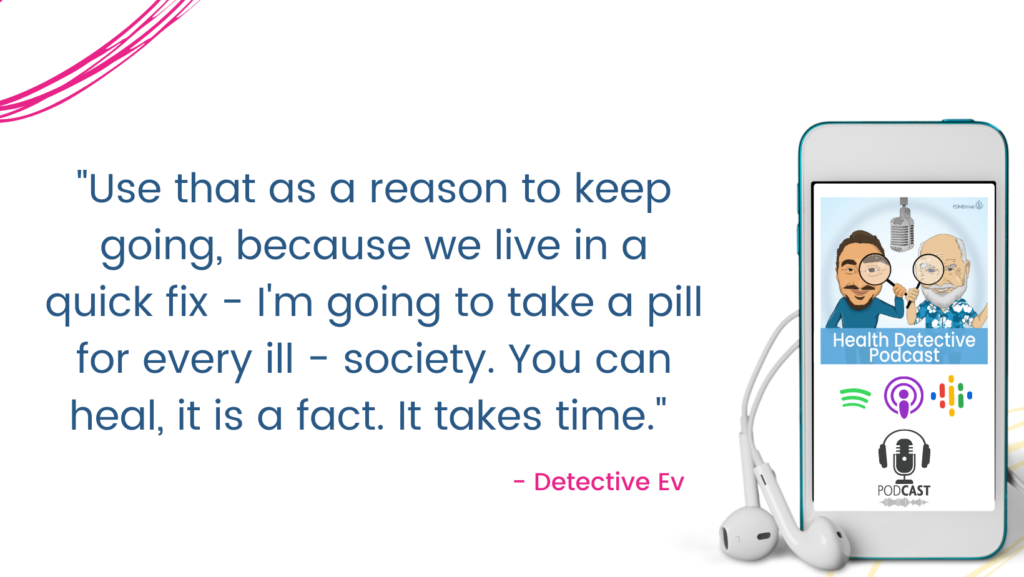
So, use that as encouragement. Use that as a reason to keep going, because we live in a quick fix – I’m going to take a pill for every ill – society. You can heal, it is a fact. It takes time. That’s just what it is. Absolutely cool.
Now I want to move into more of what you’re doing now, because there was really two reasons I wanted to bring you on. Not only because of the story. I knew that this would relate to so many people who listened to this, but also because I think you fill a gap that is very much needed. We are coaches at FDNthrive. We are probably even more considered consultants. And it’s not to say that no coaching will be done if you were to work with FDNthrive and get the labs done or whatever. But there’s only so much that can be done in a 90-day period when you are focusing on very technical lab analysis. And we need the coaching side. I know that’s where you come in with a lot of stuff.
What’s Courtney Doing Now?
So, what are you doing now? And even more importantly, why did you choose this route as opposed to just becoming maybe a traditional holistic health coach, as many graduates of IIN would, which nothing wrong with that, by the way? But you chose something specific and I’m curious how you got there.
[00:32:56] Courtney Hayes: Right.
I wanted my focus to be on primarily the woman I can relate to. I, at first, I did take more of a overall stance of like, I’ll be a holistic health coach that just focuses on making people feel good, period. I noticed when I started my Instagram account, which is basically where I promote my coaching, where I basically run my business off of. I started really opening up about my mental health journey.

And in doing that, I noticed the type of people I was attracting. I was attracting the people that were like, wow, this is me exactly, what you’re experiencing with anxiety, with OCD, with the mental health issues. I need your help. I noticed that the more I was sharing, the more people that were experiencing it too. Because, growing up, my God, I thought I was the only person that lived a life like that.
All of a sudden, just start opening up about this, my DMs (Direct Messages) were flooded weekly with, hey, I experience this too. Or, hey, I read your story. Or, hey, I heard you on this podcast, you were talking about this. I never knew, I thought I was alone too.
So, all of a sudden, that gave me this massive pull to, “let me help you with this”. You know, “let me show you that you can improve your mental health through the things that you choose to do, the way that you choose to feed your body, the way that you reframe your thoughts and your focus and what you decided to have in your life and where you put your energy to.”
So, that was ultimately my goal. I consider myself a holistic health coach, but I have more of an approach on health and life.
What Courtney Offers
[00:34:13] Detective Ev: What are you offering for people right now? Because I know in the past you’ve done them one-on-one. I know you and I were talking off the air and it might move into more of a group setting, which I think actually for this stuff is very beneficial for many reasons.
I don’t want to say it though. What are you offering?
[00:34:26] Courtney Hayes: Right.
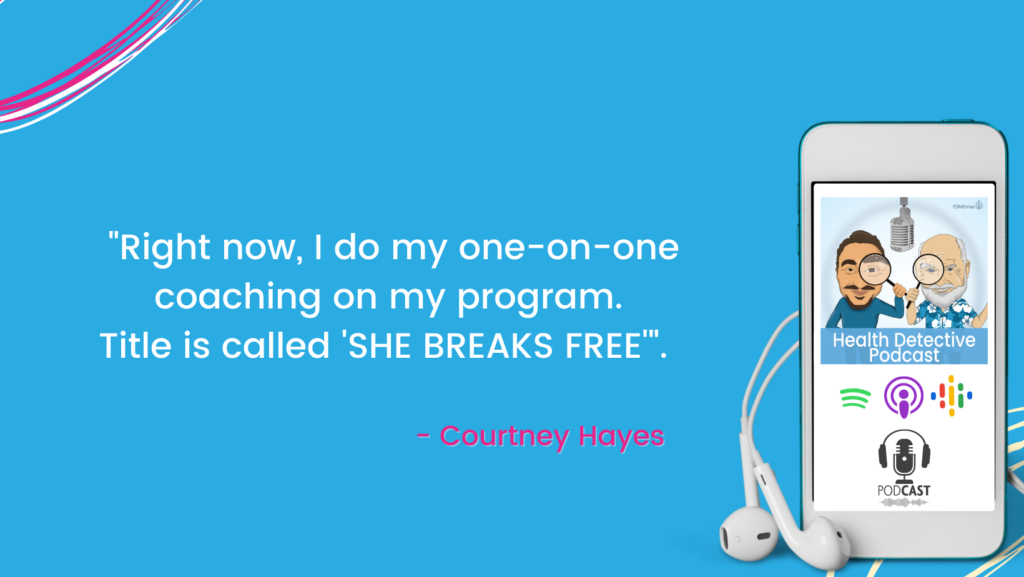
Right now, I do my one-on-one coaching on my program. Title is called “SHE BREAKS FREE”. Ultimately, just like it sounds, helping women break free from this state of being that they’re not proud of, that they’re not happy in, that they don’t feel that confident in. Helping them break out of that.

I do the one-on-one coaching and I am getting very, very close to launching my new automated course. Basically, it is a all-in-one guide breaking down the nutrition, the sleep, the healthy habits, the mindset, and just helping you break out of that. So, one-on-one and the automated is coming soon.
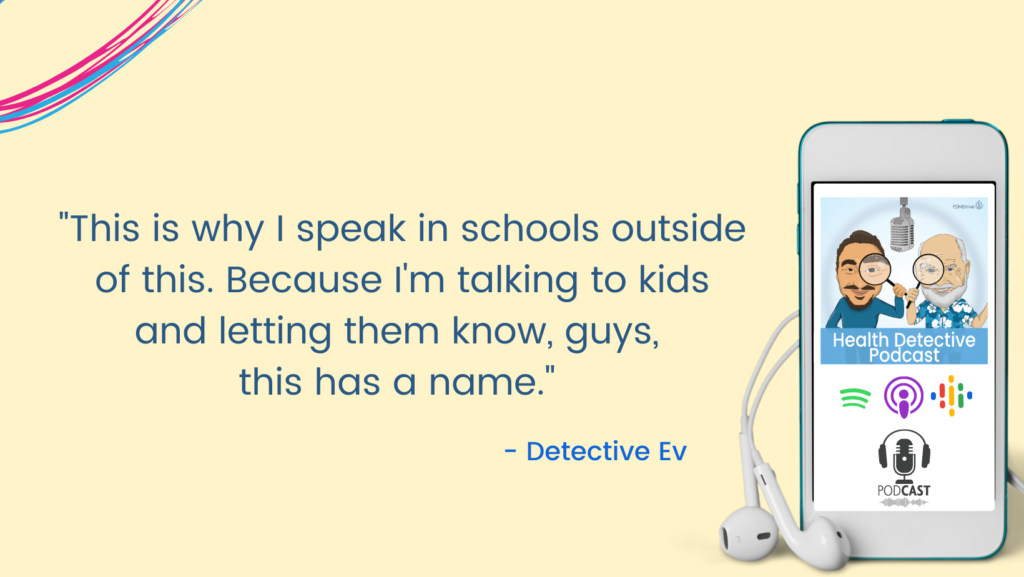
[00:34:57] Detective Ev: I love this because that was the experience. Again, so many things just so identical. I didn’t know what, I didn’t know when I was younger, and this is still happening today, even with the mental health awareness. And most people on this podcast know this, this is why I speak in schools outside of this. Because I’m talking to kids and letting them know, guys, this has a name.

This is called something, and adults fall victim to this. I think actually the older the adult is the more they fall victim to it because they just did not have the education around this stuff. It’s like, no, this is not called being crazy. It’s called having a mental health condition. As stupid as this sounds, if someone has a broken arm and has a cast, you don’t say, oh, that’s crazy. You’re like, oh, that sounds dumb. It sounds just as dumb when you say it about someone with a mental health condition. That’s a physical problem. It’s a mental health problem. It’s not the same thing.
The only time I would ever find, and I’m not a politically correct person, the only time I would ever find something like the word “crazy” appropriate is if maybe someone had a drug induced rampage or whatever, or they’re super drunk, like, all right, you can say someone’s acting crazy.
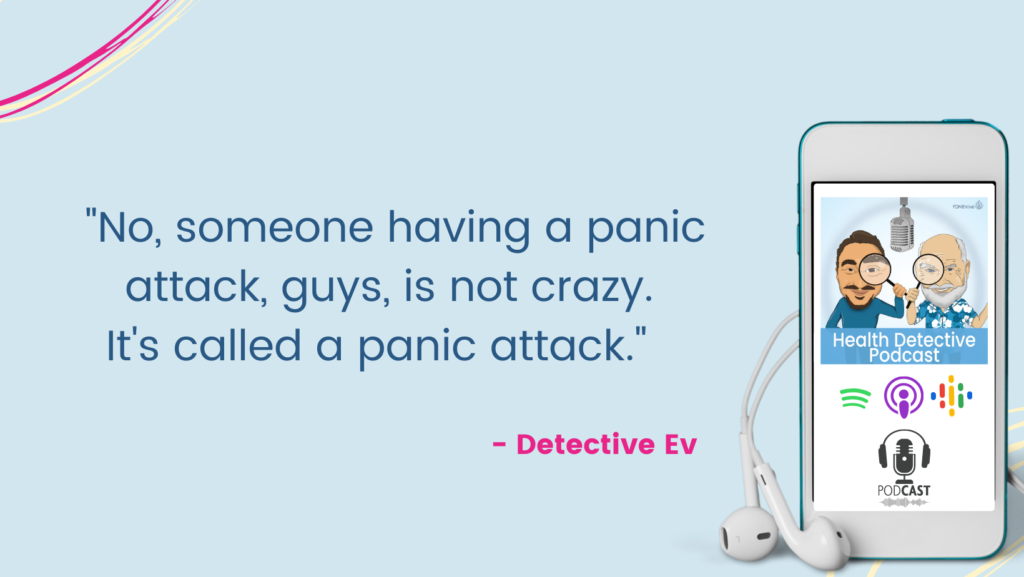
No, someone having a panic attack, guys, is not crazy. It’s called a panic attack. It’s ridiculous that I even need to emphasize that, but it’s something that’s worth saying. For people like you and I, you know, especially when you’re so young, when the adults in your life don’t even really understand it, I think it is, it’s tough and it’s invalidating.

And that’s one of the reasons why after I went to that doctor at five, Courtney, I did not go back to a doctor for this stuff at 15. It was basically because I was forced to because I kept ending up in the hospital with these panic attacks. It wasn’t something I could ignore anymore. But I knew the doctor had said. “Evan’s going to outgrow this,” and I wasn’t outgrowing it. So, I said in my little 5, 6, 7-year-old head, something must be wrong with Ev if the doctor can’t figure it out, you know?
So, I just appreciate anyone that gets out there and shares this stuff. You guys, you know, it doesn’t have to be social media. Maybe that’s not your thing, but just letting friends and family members know that you deal with this stuff because it’s hidden. People don’t get it.
Everyone, it’s so ironic, there’s so many people are afraid of judgment with it. I have found maybe, maybe 2% to 3% of people have actually judged me for this over time. And more often than not, I’ve gotten connections with people where I never would have thought that they dealt with that stuff. And they’re like, dude, I’m so glad you talk about that.
I can tell by the smile, that’s probably been your experience, you know.
Courtney Hayes: Yeah, absolutely. Yeah.
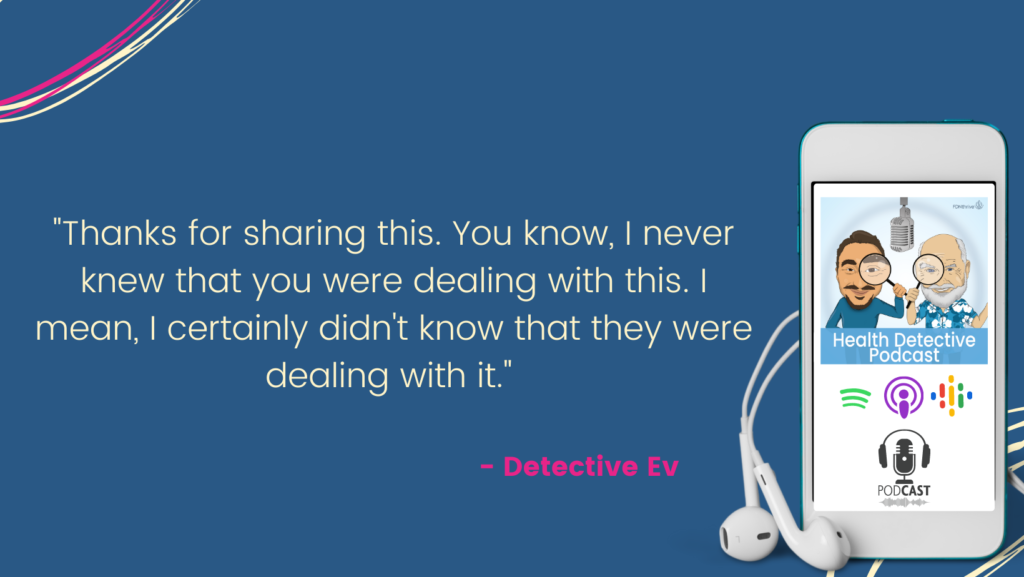
Detective Ev: You make some really unique connections that way too. I got people from high school, and I hate to even categorize people like this, but we all know that this happens. The people that were not popular at all, you know, the people that didn’t really talk to anyone versus the, well, I’ll be very vague, “sports people,” you know – people that were super popular. Everyone and their brother has messaged saying, yeah, you know, I’ve dealt with this stuff too. Thanks for sharing this. You know, I never knew that you were dealing with this. I mean, I certainly didn’t know that they were dealing with it. It’s cool.
Where To Find Courtney
Where can people find you and get connected with you if they’re interested in working with you?
[00:37:41] Courtney Hayes: My Instagram is at courthayes_, C O U R T H A Y E S with an underscore at the end.
And then my website is courthayes.com.
Courtney’s Ideal Client
[00:37:50] Detective Ev: Of course, that’ll be in the show notes, guys. And I actually did this in reverse order. I have two more questions, but I wanted to ask this one before that. Who is the ideal person to work with you?
Because it’s one thing to describe the programs. I think it’s always cool, since we have a variety of people that come on. I love to know who their ideal person is that they know that they can help. So that if someone’s listening, they’re like, I like her. Then they hear that, they’re like, oh wow, that’s me. Then it’s a no-brainer to work with you or at least connect with you.

[00:38:14] Courtney Hayes: I work with women, hence my program named “SHE BREAKS FREE.” But I do work with women who are struggling with their anxiety, struggling with their mental health, struggling with the place that they’re at in their life. The women who are feeling stuck and they just know that they want more for themselves, but they don’t know how. They don’t know the steps to take.
[00:38:28] Detective Ev: And then just to make a final clarification. This is great because no one’s saying don’t work with your psychiatrist, even work with people at FDNthrive – get the lab test done. But you’re fitting the gap that is so desperately needed outside of those two things.
[00:38:41] Courtney Hayes: Making those lifestyle changes, making those life changes that, you know, you can go to the doctor, you can do this, you can do that. But like, here’s how to ultimately fill in the puzzle pieces here.
[00:38:49] Detective Ev: Wonderful.
Courtney’s Magic Wand
Well, I only have one more question for you and then we’ll wrap it up for today. It is the signature question on the Health Detective Podcast, no wrong answers. The signature question is if I was, in this case, to give Courtney a magic wand and you could get every single person in this world to do one thing for their health, whether that’s literally do one thing or maybe stop doing one thing, what is the one thing that you’d get them to do?
[00:39:14] Courtney Hayes: Eat more whole foods. Eat more whole foods. It has to be one? Because my mind is going up with a bunch of things
[00:39:20] Detective Ev: So many people have thrown in two, feel free.
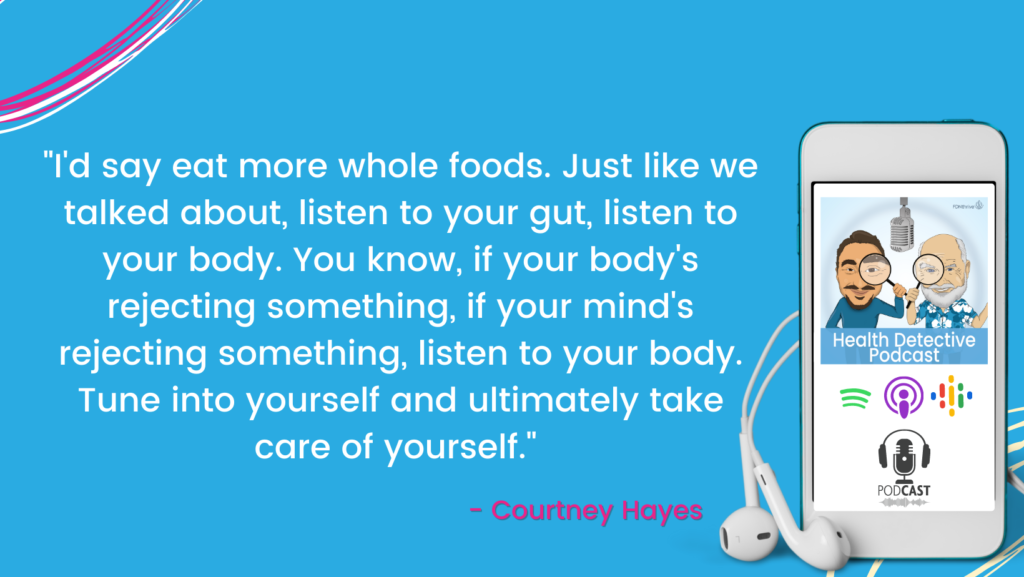
[00:39:24] Courtney Hayes: I’d say eat more whole foods. Just like we talked about, listen to your gut, listen to your body. You know, if your body’s rejecting something, if your mind’s rejecting something, listen to your body. Tune into yourself and ultimately take care of yourself.
[00:39:36] Detective Ev: Excellent.
Best of Both Worlds – Just Not There Yet
I want to finish up today by really just rewinding for a second and commending Courtney for what she said in the beginning, or the excerpt that we used in the beginning rather, and what she was saying to herself at the end of that doctor’s appointment is, you know what, I don’t know what to do. I don’t know how to fix this necessarily. But I’ve been dealing with this for 14 years and no one’s helped me. Now I’m being recommended something that is literally illegal. I got to go figure out something else. I don’t want anyone to have to feel that way. I don’t want young people, especially, to have to feel like they need to go away from the conventional Western medicine route.

I wished that there was systems in place that we could get the best of both worlds. We could automatically optimize for every individual, patient, or client based on where they’re currently at. We’re just not there yet. You know, there’s a lot of back and forth about what we should do or what we shouldn’t do, or how much influence conventional medicine should have versus functional medicine.
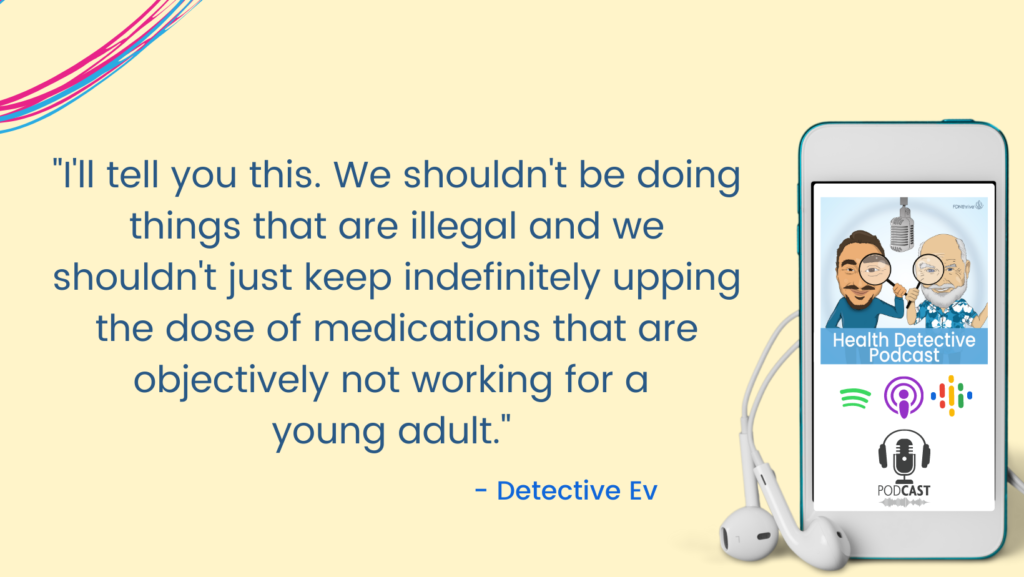
I’ll tell you this. We shouldn’t be doing things that are illegal and we shouldn’t just keep indefinitely upping the dose of medications that are objectively not working for a young adult. Tell me how that makes any sense.
I don’t think it does. On the plus side, this led Courtney to finding out the truth for herself, figuring out how to help other people. Look at how she’s turned this around and now serve others. I mean, that’s amazing.
Conclusion
Go check out her dad too – glutendude.com. His website’s awesome. He’s got a podcast there as well – shorter episodes, seem like very quick, short, and to the point. If you like that, definitely something to check out as well.

But, Courtney, man, well, woman, thank you for coming on and just sharing your story and being vulnerable. This happens to so many people and it’s so unfair. The more that we talk about this, the quicker we can have a resolution on a societal level. That’s what we need. But other people don’t realize that others have gone through this if we all keep silent and just don’t talk about it.
Thank you for coming on. And hey, thank you guys for listening. If you like this information that we’re sharing, please be so kind as to leave us a five-star review on Apple Podcasts and Spotify as well.
We are looking forward to talking to you guys again soon with yet another interview. But until then, take care. We love you guys. Have a good one.
[00:41:59] Intro Voice: Thanks for tuning into the Health Detective Podcast. If you are ready to finally work with a real health detective on your health journey so that you can get well and stay well naturally, visit us at fdnthrive.com and click the “Get Started Here” button.


